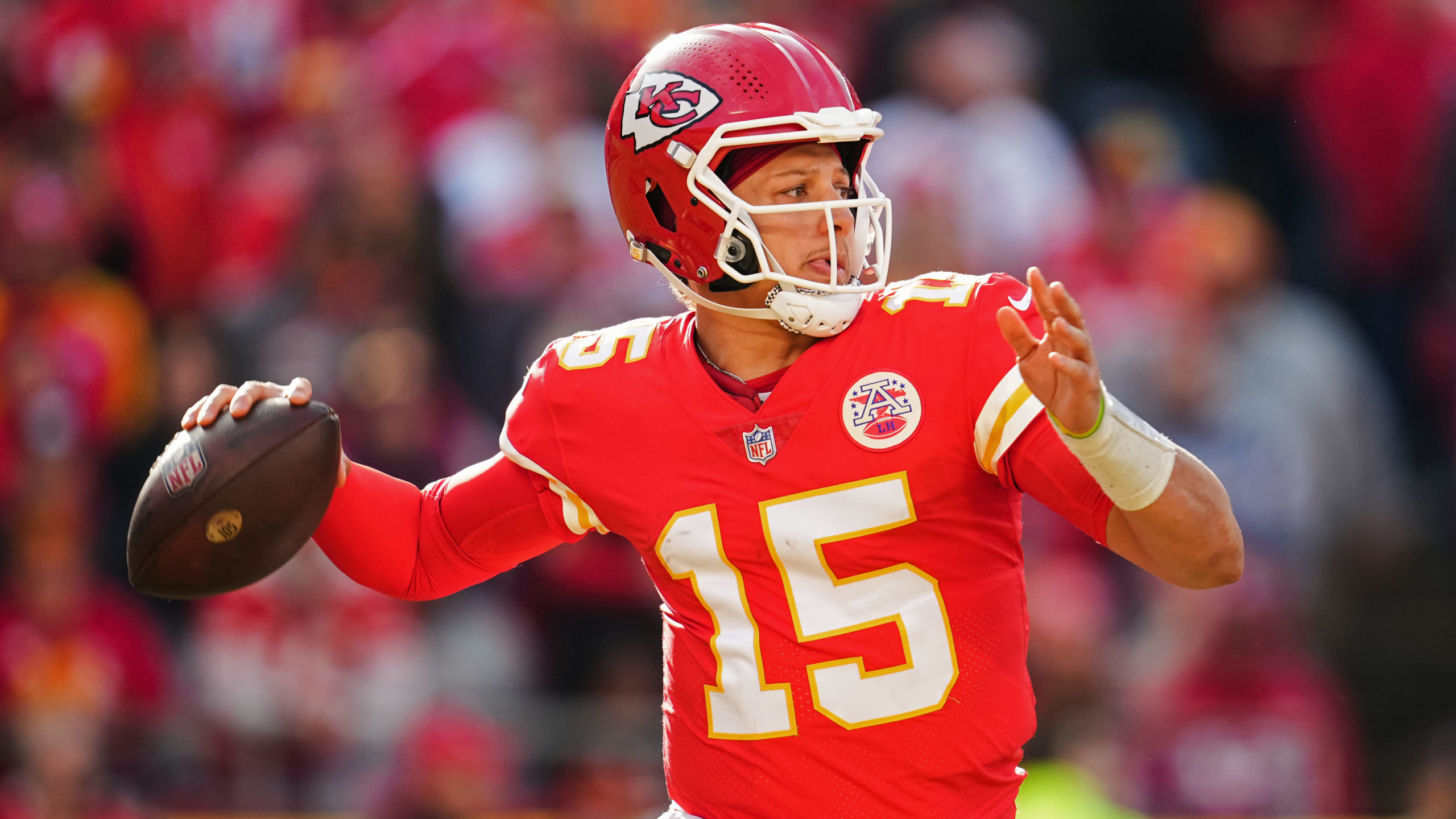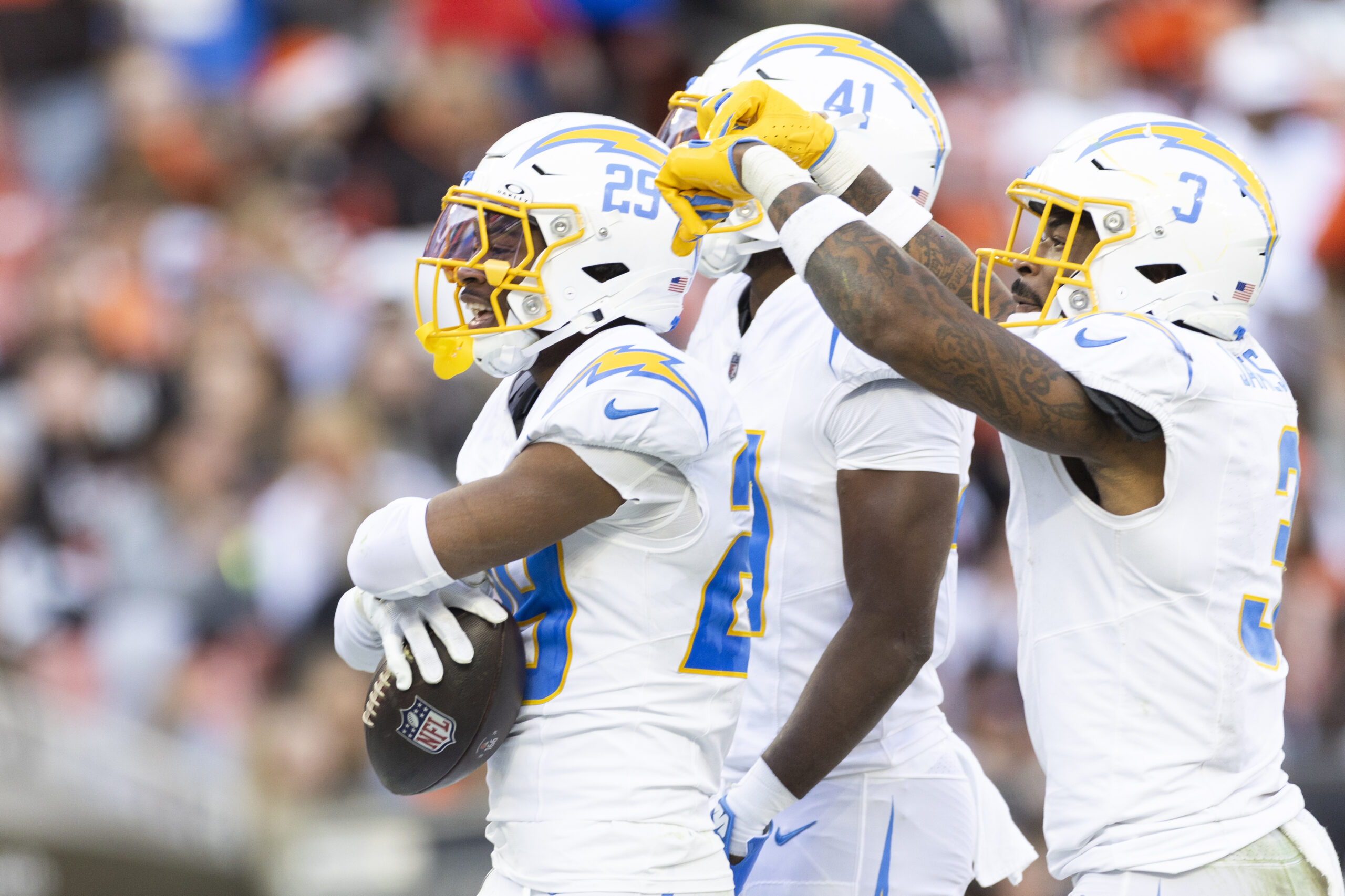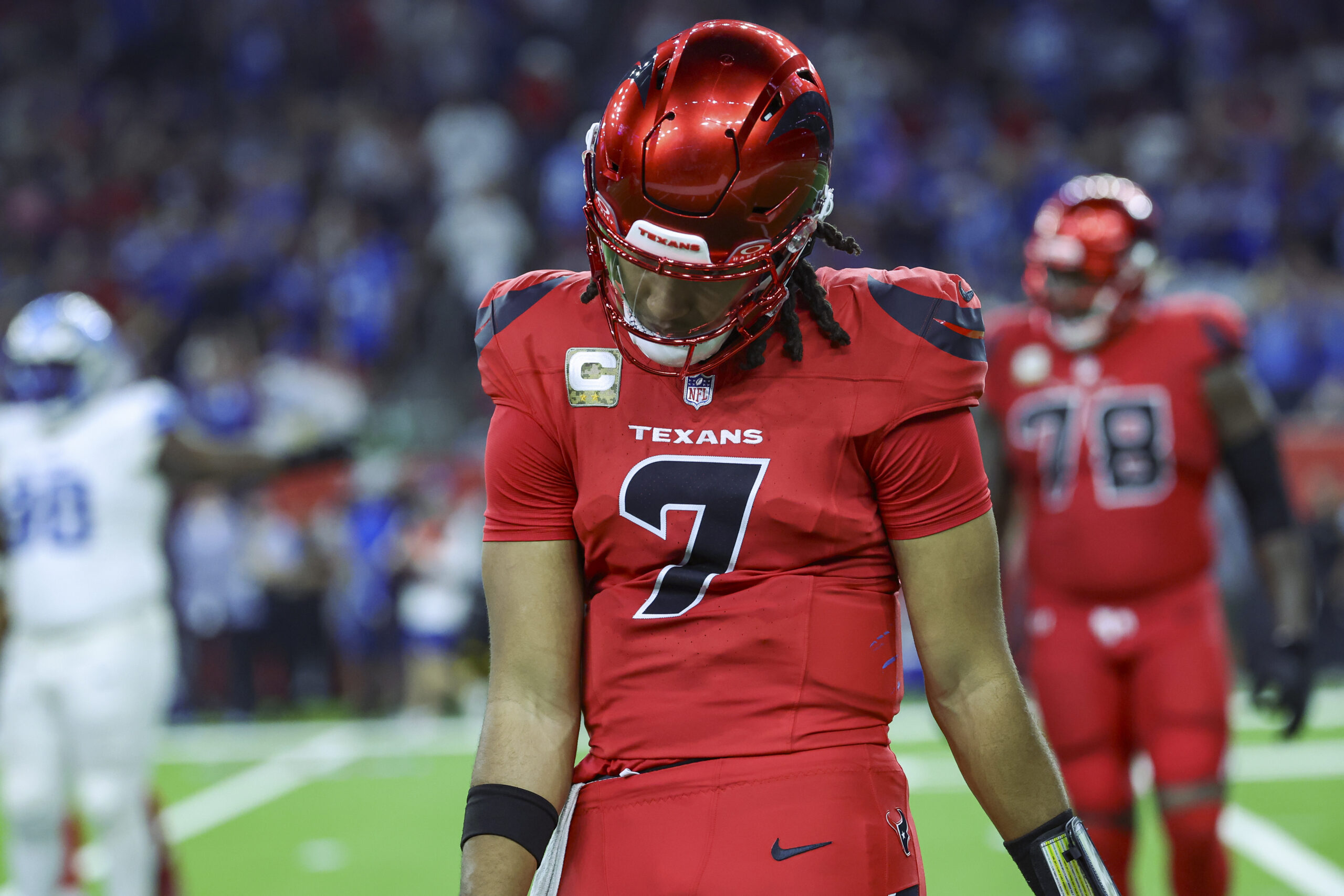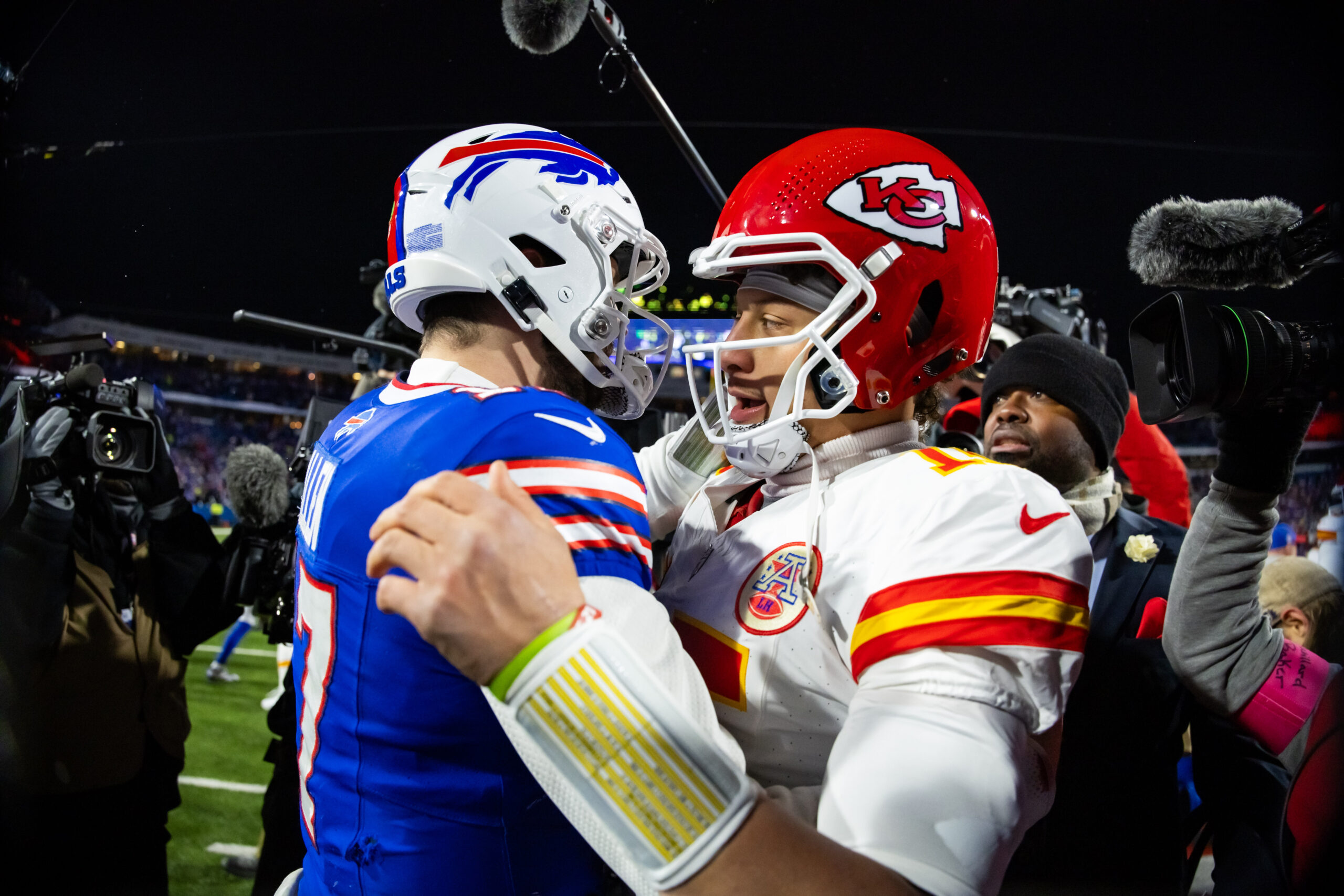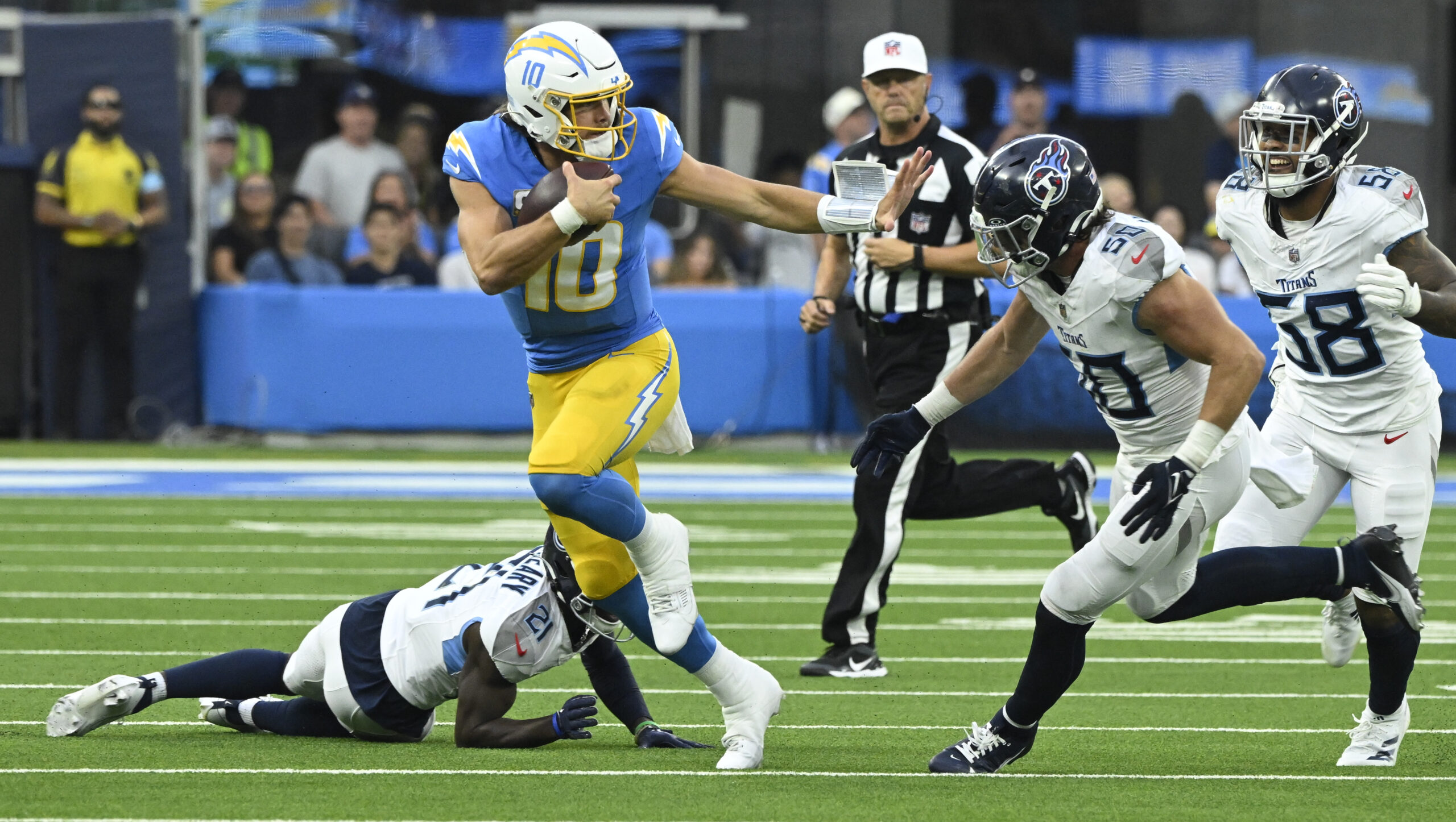NFL Analysis
July 17, 2024
27 min read
Every NFL Team's Best Quarterback In Team History
The NFL began in 1920 when 10 teams formed the first iteration of what is now the biggest sport in the United States. How the game is played has changed drastically each decade, bringing out the world's most talented and skilled athletes. At the center of the NFL's history are innumerable difference-making quarterbacks.
All 32 franchises have enjoyed at least one stint of tremendous quarterback play. We dove through the stats, adjusted for each era, tallied up team and playoff success, and considered advanced metrics that help isolate a player's individual contributions to form a list of every team's best QB in franchise history. This list is not simply about the most naturally gifted quarterback to suit up.
Some teams had several great candidates, making it hard to choose just one, while other franchises have endured bad apples throughout their history.
Best NFL Quarterbacks in Team History
Starting in the AFC East, we'll touch on each team and why each nominee earned the title of the best quarterback in franchise history.
AFC East
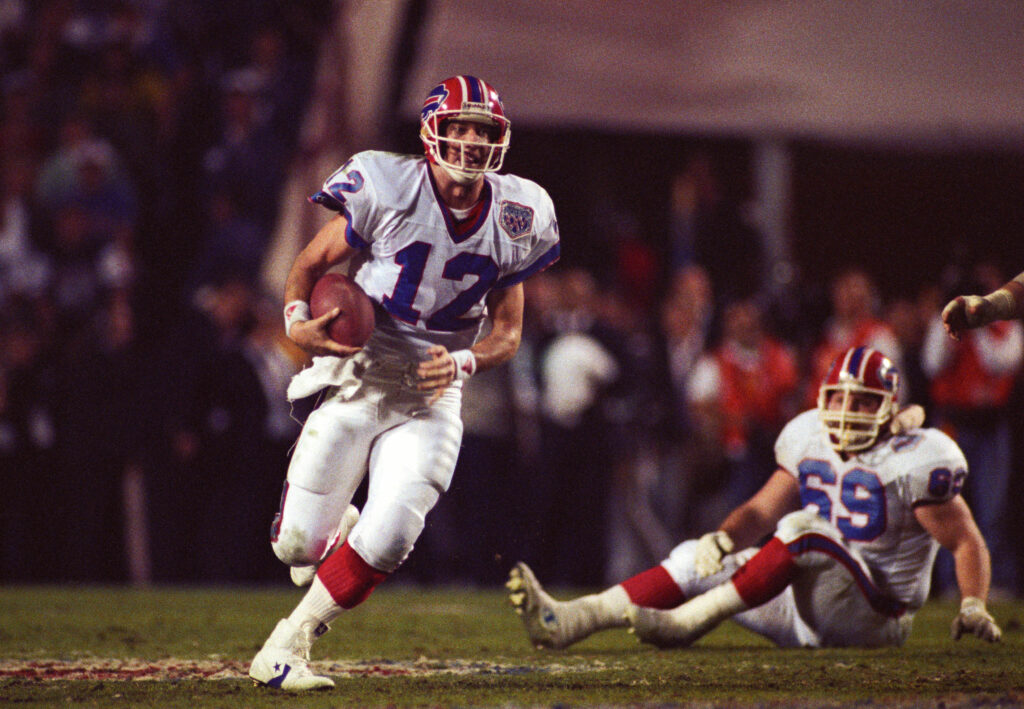
 Buffalo Bills: Jim Kelly
Buffalo Bills: Jim Kelly
While Josh Allen is on the fast track to becoming the best player in Buffalo Bills history, Jim Kelly set the standard for Buffalo fans from 1986 to 1996. He won 101 of his 160 games, completing 60.1 percent of his 4,779 attempts in a time when only a small handful of quarterbacks were over the 60 percent mark in any given season. His strong arm and aggressive mindset defined the Bills' K-Gun offensive scheme and had the franchise on the brink of a dynasty in the early 1990s.
Though Kelly never won a ring, the Hall of Famer was central to a routinely elite offense throughout his tenure. The Super Bowl was the only glaring sore spot on his resume, and it's unfair to pin a few missed field goals on Kelly.
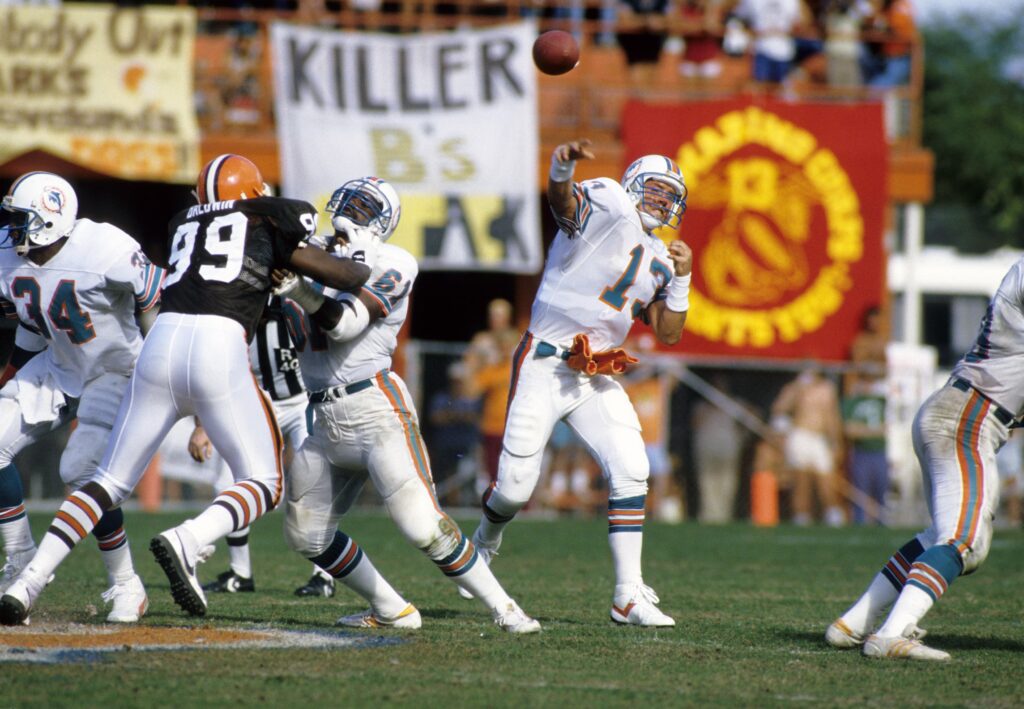
 Miami Dolphins: Dan Marino
Miami Dolphins: Dan Marino
Many would argue that Dan Marino is the most feared passer in NFL history. The only thing more powerful than his right arm was his downfield playmaking. Leading the league in yards five times, touchdowns thrice, and finishing as one of the most productive passers over his 17 years, Marino's legacy garners incredible respect from peers and historians.
How many touchdowns would @DanMarino throw in a 17-game season under today’s rules? pic.twitter.com/eBX7xEbzQn
— NFL Legacy (@NFLLegacy) September 15, 2021
Unfortunately, Marino never won the ring he deserved. The nine-time Pro Bowler and three-time All-Pro ran into an all-time San Francisco 49ers team in 1984, and he never found his way back to the Super Bowl. There's never been a better quarterback not to win a title in the league's history.
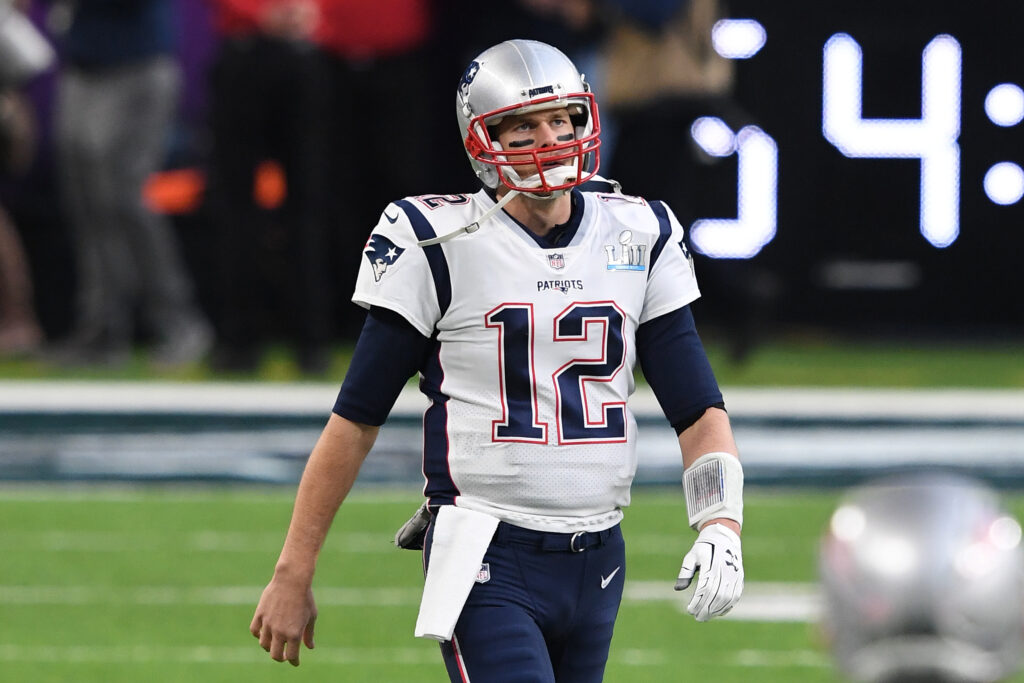
 New England Patriots: Tom Brady
New England Patriots: Tom Brady
Tom Brady is the NFL's best winner of all time. The 15-time Pro Bowler won seven Super Bowls, six with the New England Patriots, and accomplished everything imaginable on the football field. He would've been a first-ballot Hall of Fame inductee even if his career was cut in half.
The Patriots' history of quarterbacks is bleak beyond Brady, but he headed a dynasty reign that seemed impossible throughout the salary cap era. His cerebral accuracy, consistency, and maneuverability in the pocket weren't the sexiest game, but they defined a dominant career.
When @DrewBledsoe came in for an injured Tom Brady in the AFC Championship. (Jan. 27, 2002) pic.twitter.com/682YDo681I
— NFL Legacy (@NFLLegacy) August 1, 2020
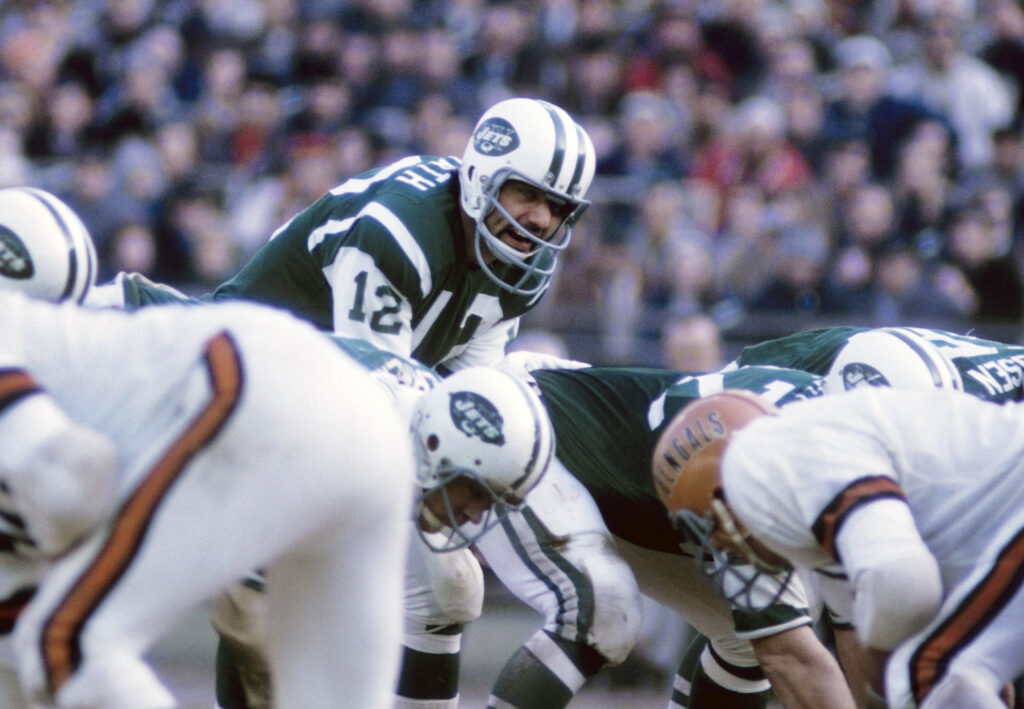
 New York Jets: Joe Namath
New York Jets: Joe Namath
The New York Jets haven't had many decent quarterbacks to root for throughout their history, as only three passers who have started more than 16 games have a winning record.
Joe Namath didn't break .500, going 60-61-4, but he won the franchise's only Super Bowl, was the shining star of a defining moment in league history, and had 1.5 times higher annual value than Ken O'Brien.
Namath's stat line was far from impressive, as he finished with more interceptions than touchdowns in 11 of his 13 seasons. Smokin' Joe was a vibe who showed up in the Jets' biggest moments before injuries stole most of his prime years. O'Brien, Vinny Testaverde, and Chad Pennington had their moments, but none had a star as bright as Namath's.
AFC North
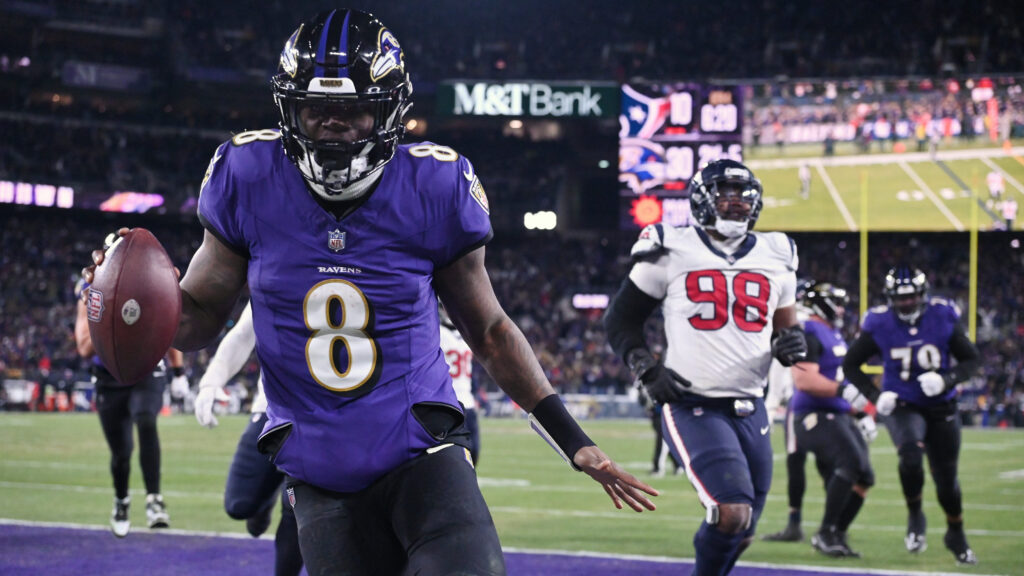
 Baltimore Ravens: Lamar Jackson
Baltimore Ravens: Lamar Jackson
While Joe Flacco has a Super Bowl ring and more than double the number of passing yards than Lamar Jackson, the latter has been far more impressive in a short amount of time from an individual standpoint.
Jackson is one of few active quarterbacks with a higher annual value (93) than games played (86), and he's already on the heels of Flacco despite playing half the number of years. The two-time NFL MVP is the league's most electric playmaker at the position.
Jackson's playoff performances have justifiably brought criticism, but the 27-year-old is just now entering his peak. His passing consistency continues to improve, and he'll continue to be a menace for defenses to face for another decade.
Anyways here are some Lamar Jackson MVP season highlights pic.twitter.com/qg9i9SVWbq https://t.co/rPvpGJbrZJ
— Vez (@CookedbyVez) August 24, 2023
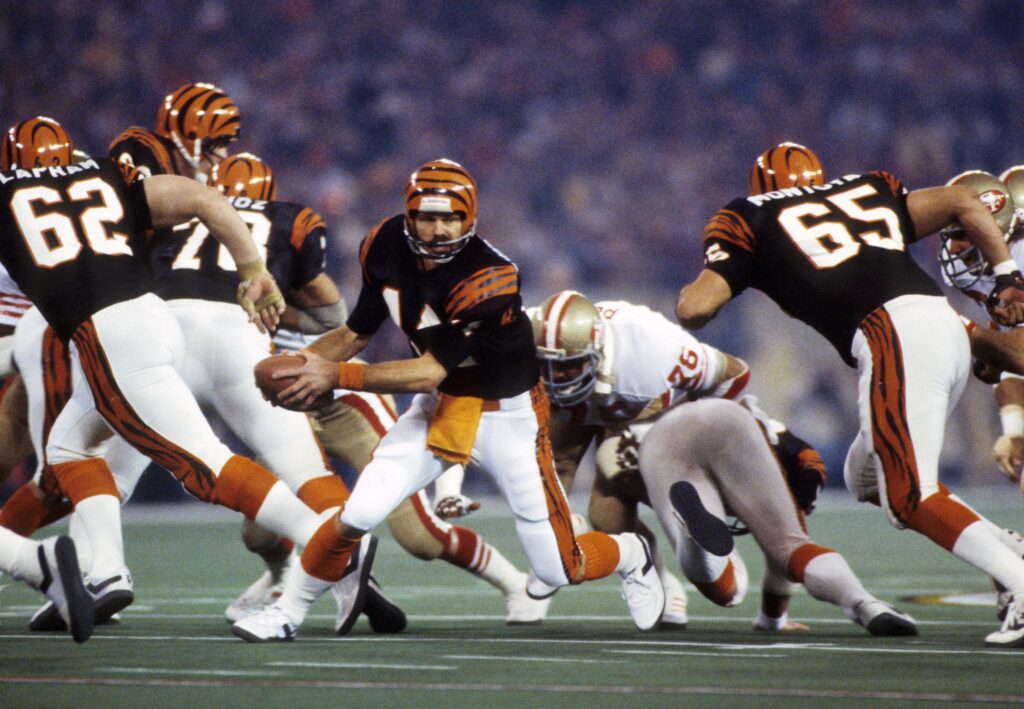
 Cincinnati Bengals: Ken Anderson
Cincinnati Bengals: Ken Anderson
Not only have the Cincinnati Bengals developed an impressive history of quarterback, but they're in the midst of a career that could usurp them all in Joe Burrow. However, for now, Ken Anderson holds the title. The 1981 NFL MVP and All-Pro led the NFL in completion rate three times, yards twice, and finished with double-digit wins in four seasons.
Anderson still leads the franchise in passing yards and annual value despite quality careers from Andy Dalton, Boomer Esiason, and Carson Palmer. Along with his passing records, he won 91 of 172 games started and added 20 rushing scores throughout his career. He was remarkably solid for rosters that rarely had much else going for them.
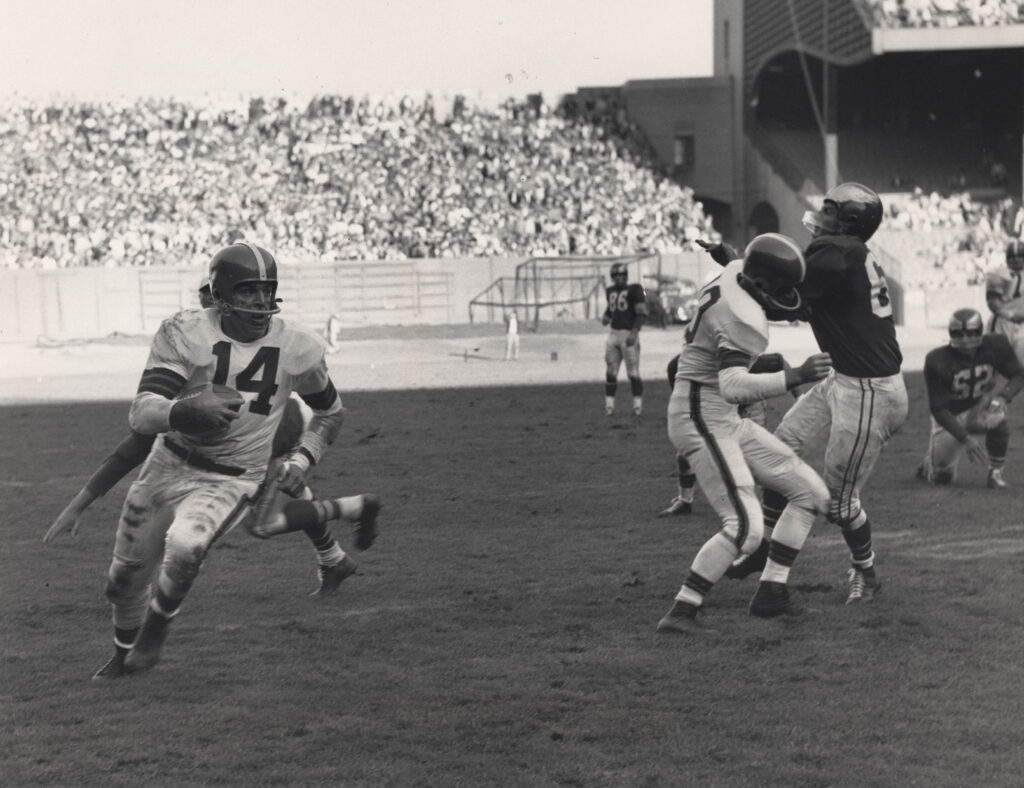
 Cleveland Browns: Otto Graham
Cleveland Browns: Otto Graham
Otto Graham, the lone Hall of Fame quarterback in Cleveland Browns' franchise history, is easily atop the perch for the Browns. On top of 5 Pro Bowls, seven All-Pro nods, and three NFL Championships, Graham was routinely the best passer in the league throughout his 10 seasons. Graham led the league in completion rate four times, passing yards five times, and touchdowns thrice.
With a career average of nine yards per attempt and a touchdown rate of 6.6 percent, Graham was one of the original ballers at the position. He delivered huge plays and racked up victories before Super Bowls were a thing, but his winning ways can't be discounted enough to slide Brian Sipe or Bernie Kosar ahead of him.
Otto Graham was the @Browns' QB from 1946-55. In all 10 seasons, he took Cleveland to its league's championship game.
— Pro Football Hall of Fame (@ProFootballHOF) December 18, 2023
We pause to remember Graham on the 20-year anniversary of his passing. #HOFForever pic.twitter.com/GeKHHfCKZY
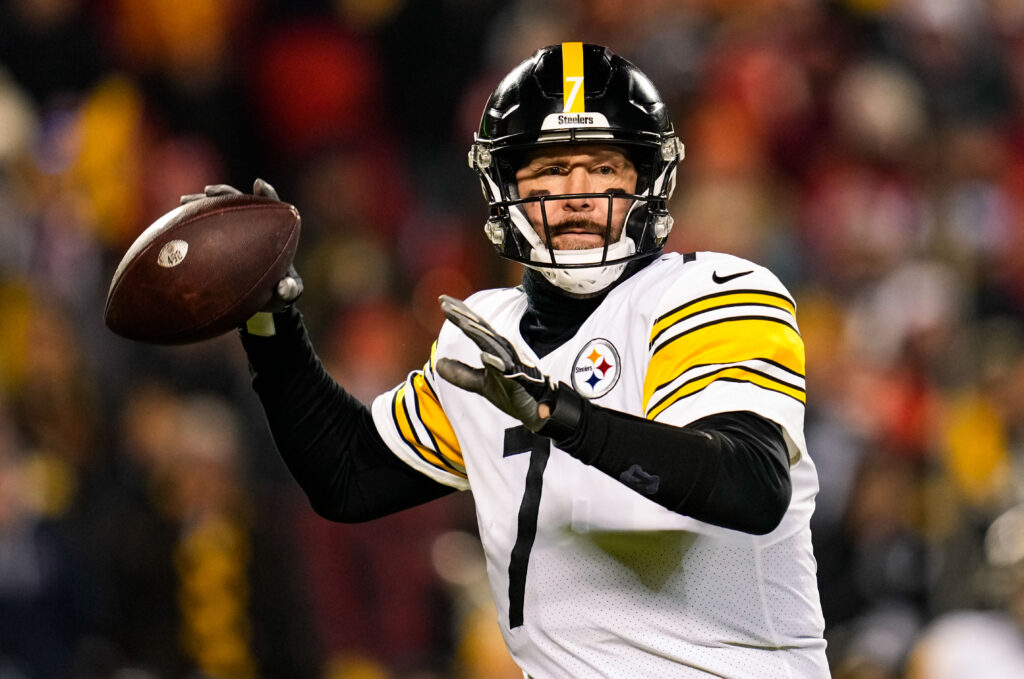
 Pittsburgh Steelers: Ben Roethlisberger
Pittsburgh Steelers: Ben Roethlisberger
For as meaningful as Terry Bradshaw was for the Pittsburgh Steelers' Steel Curtain dynasty, Ben Roethlisberger evolved from a successful game manager as a rookie to a feared big-play hunter who drove elite offenses throughout his prime.
Bradshaw won two more Super Bowls than Big Ben but barely finished his career by completing over half his passes and with more touchdowns than interceptions. Roethlisberger had over 36,000 more yards, 216 more touchdowns, and only one more interception in 81 more games.
With his powerful arm, the ability to stay upright through contact, and playmaking, Roethlisberger was always amongst the league leaders in key metrics. He led the league in yards twice and earned six Pro Bowls. Roethlisberger will be a Hall of Fame lock when he's eligible in 2027.
AFC South
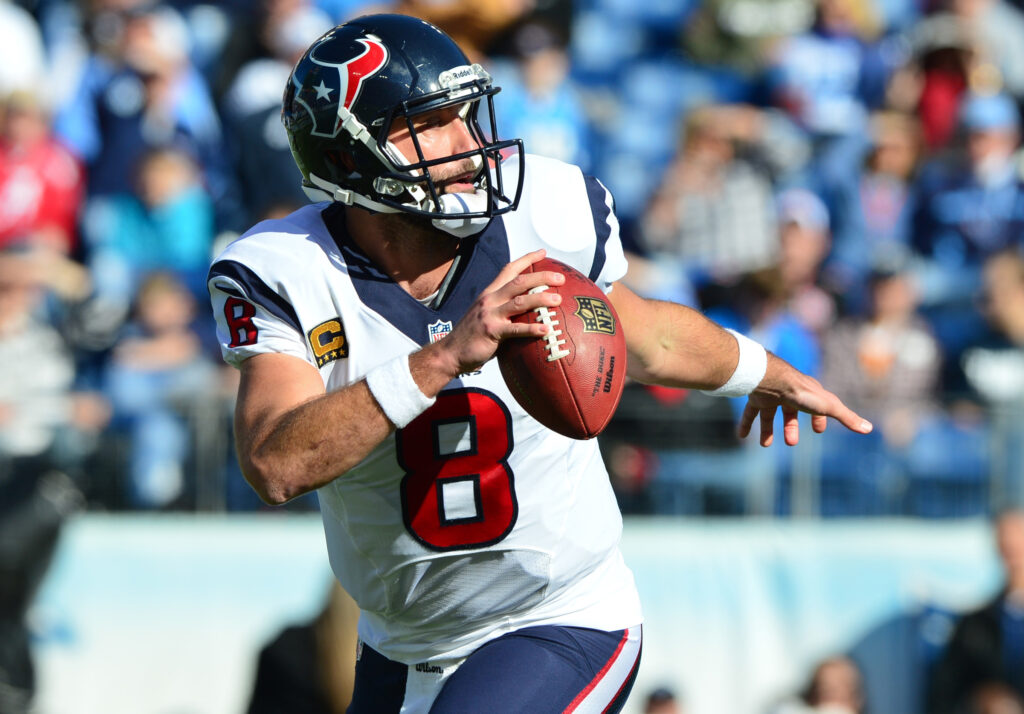
 Houston Texans: Matt Schaub
Houston Texans: Matt Schaub
An abrupt off-field scandal disrupted what seemed like a straightforward path for Deshaun Watson to rewrite the Houston Texans' history books.
Watson's annual value outpaced his games played during four years, which is an exclusive club of QBs who accomplish this. With Watson long gone and C.J. Stroud establishing himself as the franchise's new face, it's likely Schaub will soon see Stroud challenge his records.
But that's not to take the shine away from Schaub. His stretch from 2008 to 2012 brought consistency to a team with an average roster that was finding its footing after being a bad expansion team. He threw for 4,000 yards three times and made the Pro Bowl twice.
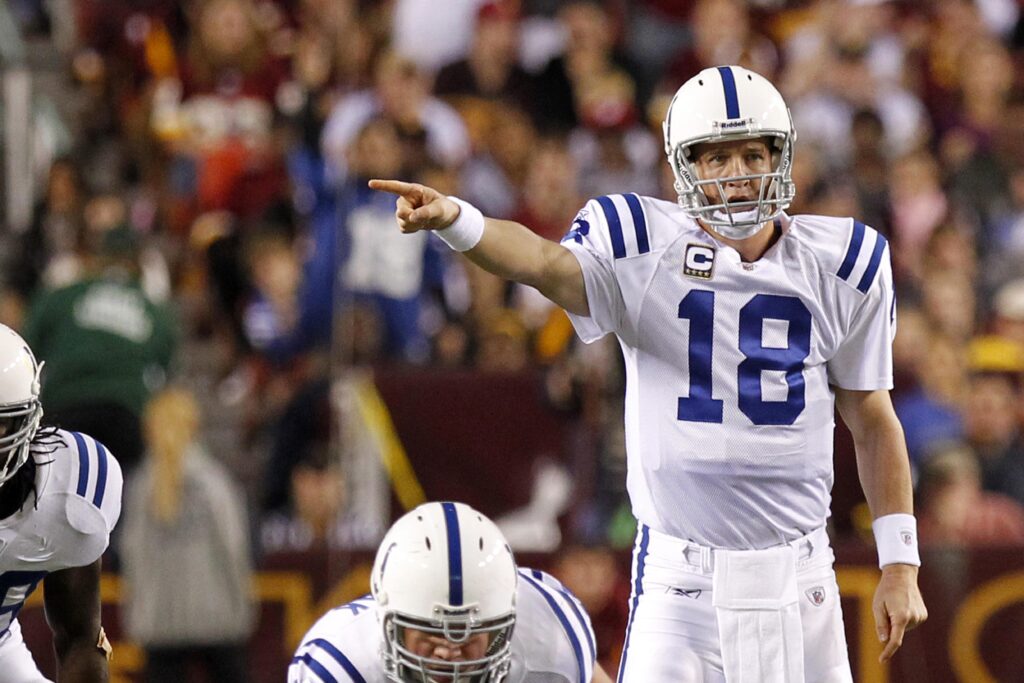
 Indianapolis Colts: Peyton Manning
Indianapolis Colts: Peyton Manning
Quarterbacks like Johnny Unitas, Andrew Luck, and even Earl Morrall would challenge to be top dogs for several franchises, but this one is easily Peyton Manning's mantle. Manning repeatedly rewrote the team's record books during his 13 years on the field. He and Brady went back and forth in an epic career duel.
His almost mechanical ability to process defenses was only upset by his daring aggressiveness to feed high-end playmakers. Manning ripped off a six-year and an eight-year streak with at least 4,000 yards passing and set the NFL record with 55 touchdowns in one season. Even though his last four seasons were spent in Denver, the Colts enjoyed 11 seasons with at least 10 wins while he was under center.
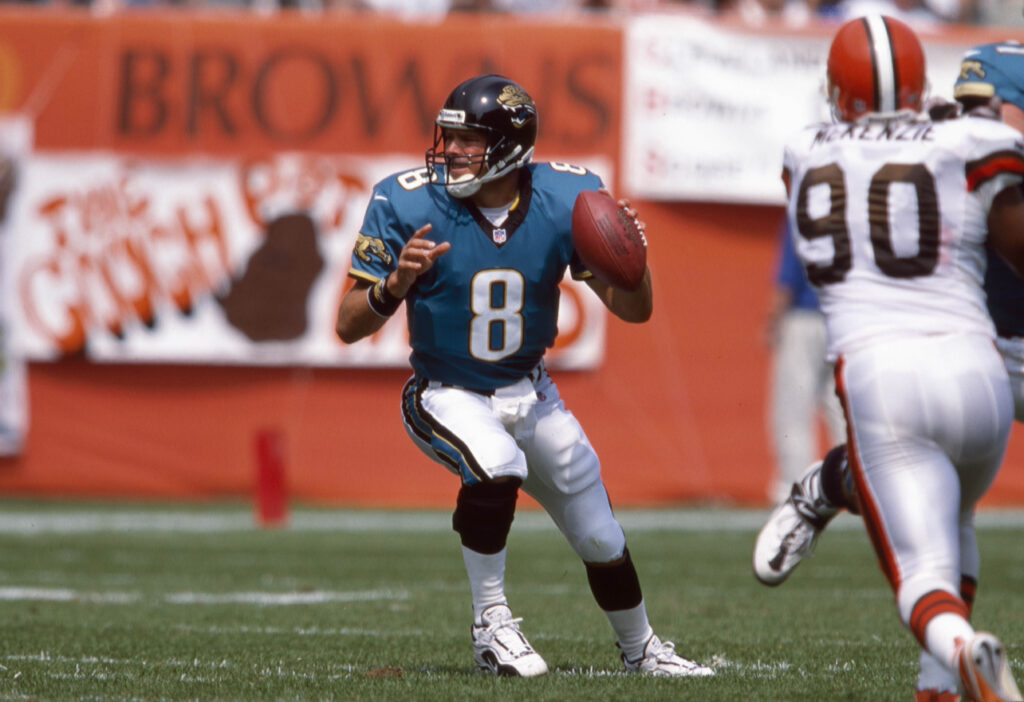
 Jacksonville Jaguars: Mark Brunell
Jacksonville Jaguars: Mark Brunell
The Jacksonville Jaguars have fielded some feisty teams since their inception 30 years ago. Quarterbacks like David Garrard, Byron Leftwich, and even Blake Bortles produced promising stretches. But none, including Trevor Lawrence, thus far, have matched the steady hand of Mark Brunell.
Brunel wasn't overly flashy but efficient and a threat with his legs. He completed over 60 percent of his passes over nine years with a newly established team and earned three Pro Bowl nods by turning 30. Ahead by 24 wins and 8,052 passing yards over the franchise's second-leading QBs in those categories, Brunell is still well ahead of his peers.
Would Mark Brunell thrive in today’s game? @M_Brunell8 pic.twitter.com/VwpKEtNyCM
— NFL Legacy (@NFLLegacy) August 25, 2021
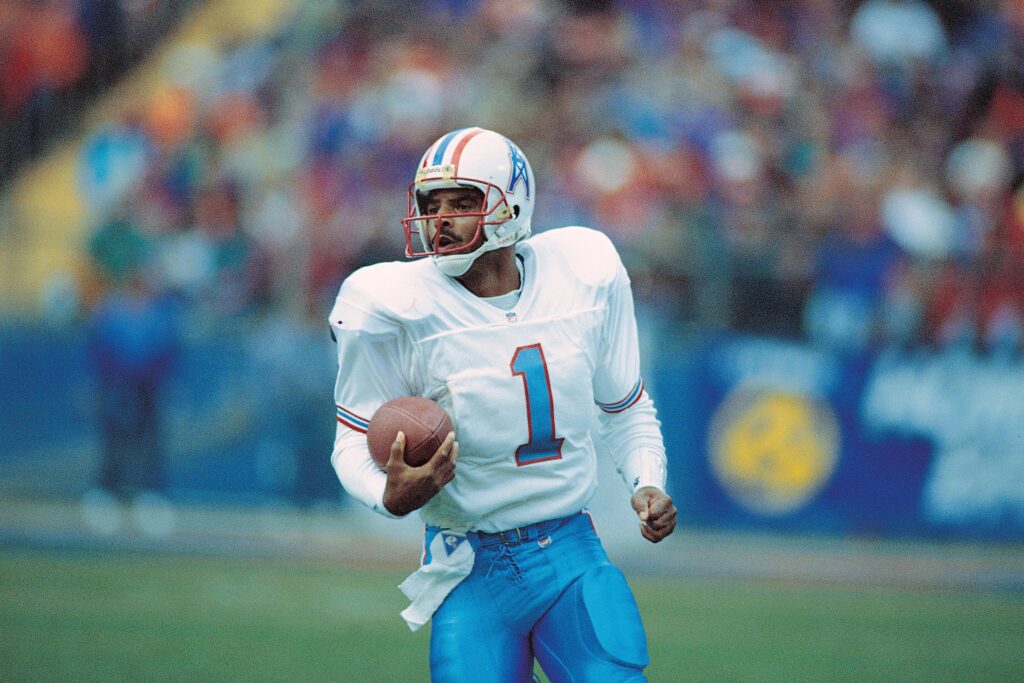
 Tennessee Titans: Warren Moon
Tennessee Titans: Warren Moon
Since the Tennessee Titans kept the history of its time in Houston, this franchise has a better list of quarterback names than what some might expect. Archie Manning, Matt Hasselbeck, Ken Stabler, Kerry Collins, and George Blanda are littered throughout the franchise's passing index. The franchise's top two quarterbacks are synonymous with two different locations, though.
While Steve McNair successfully ushered in the Titans' era in Tennessee, Warren Moon is one of the most important quarterbacks of the NFL post-merger. Besides the fact that Moon had more than 6,000 yards, 41 touchdowns, and a higher annual value throughout his career, he reshaped what many thought could be done and how people should look while playing the quarterback position. Moon was a high-volume, explosive puppetmaster of the Run-and-Shoot offense after entering the NFL from the CFL at age 28.
AFC West
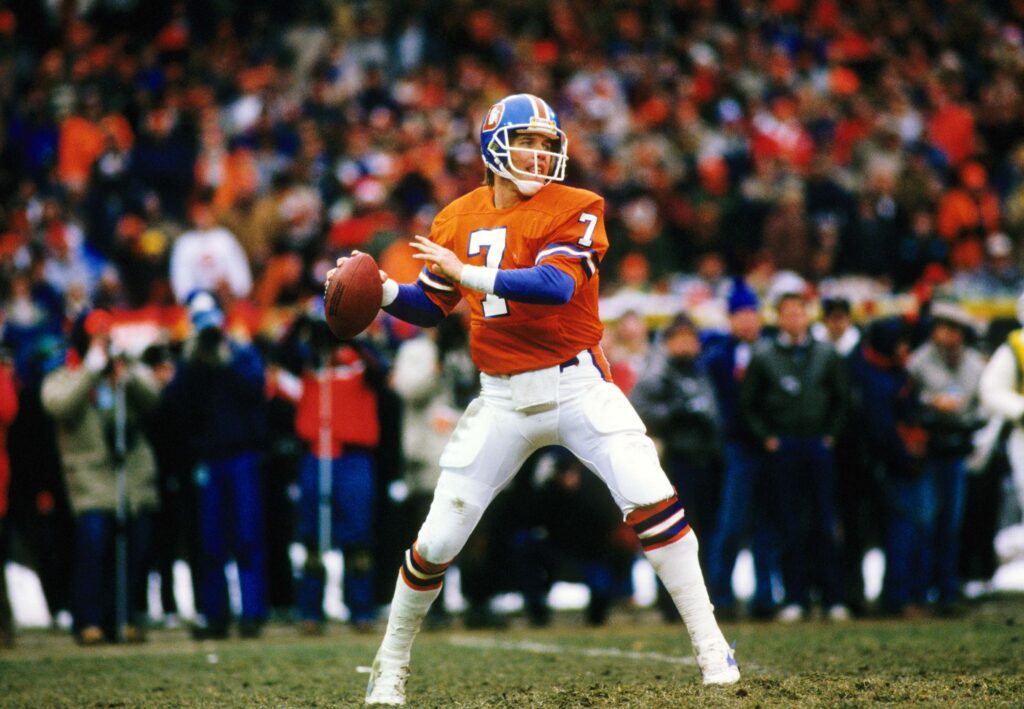
 Denver Broncos: John Elway
Denver Broncos: John Elway
Manning had a great four-year stint with the Denver Broncos, but this will always be John Elway's franchise. For much of his career, Elway dragged the Broncos to relevance, relying on his strong arm and athleticism to make big plays. He threw his fair share of interceptions from being so aggressive, but the Broncos finally found the right balance to ease the pressure off him in his later years.
With 51,475 yards, 300 touchdowns, and 148 wins in his belt, Elway was part of a special era of quarterbacks whose impact exceeded the raw stats. He was a physical marvel, unafraid of pushing his body's and his teammates' limits.
John Elway threw LASERS 💥💥💥 @Broncos pic.twitter.com/8qL7X4lErN
— NFL Legacy (@NFLLegacy) June 28, 2019
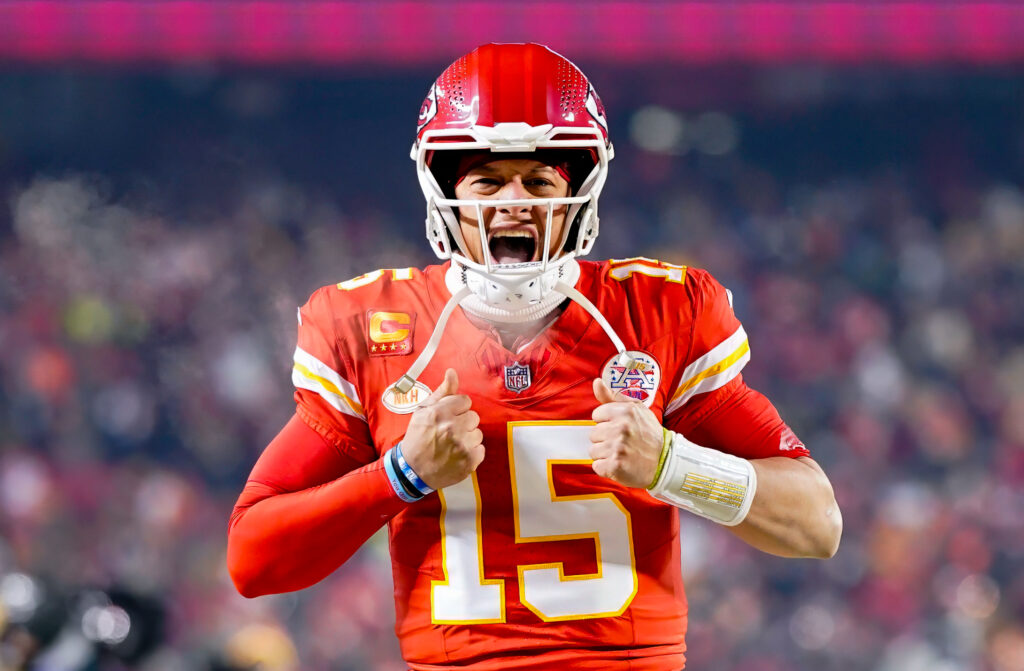
 Kansas City Chiefs: Patrick Mahomes
Kansas City Chiefs: Patrick Mahomes
The Kansas City Chiefs have six quarterbacks who started at least 76 games, so they have more competition than most franchises for its top billing. Len Dawson was the undisputed best QB of their history until Patrick Mahomes. Mahomes, who has started 87 fewer games than Dawson, will surpass Dawson's passing yardage and touchdown records this fall.
Turning 29 this September and already with two All-Pro nominations and three Super Bowl rings, Mahomes is setting himself up to challenge for the title of best quarterback of all time. He might not reach Brady's seven rings, but his rare talent, timely playmaking, and ability to adjust on the fly have put him on a similar path as Brady.
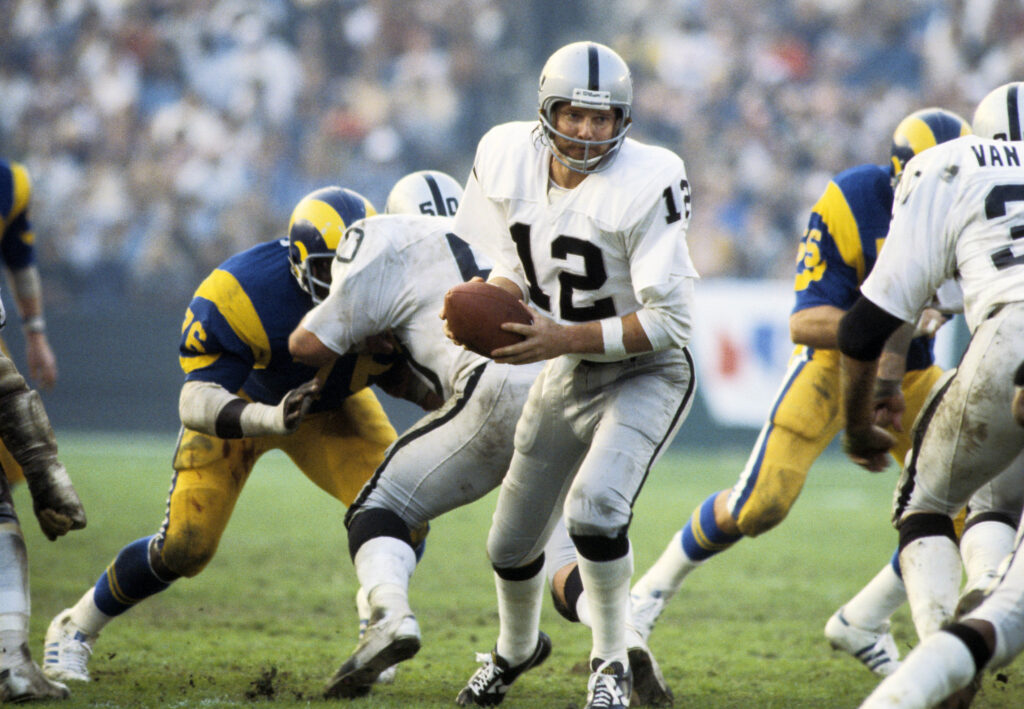
 Las Vegas Raiders: Ken Stabler
Las Vegas Raiders: Ken Stabler
There are times when the stats fail to show the whole picture, and the Las Vegas Raiders' all-time passing leaderboard fits the bill. While Derek Carr has played more games and completed a higher percentage of attempts for more yards and touchdowns than Ken Stabler, Daryle Lamonica, and Rich Gannon, he's nowhere near those three in the franchise's lore. Of those three, Stabler stands above his peers.
The Raiders were a force throughout the 1970s, and Stabler's blend of efficiency and ability to find big plays defined John Madden's offense. He completed just under 60 percent of passes for 150 touchdowns over 10 seasons in Oakland, winning 69 of his 96 starts. Stabler had a winning record in eight straight years before heading to Houston, including a victory in the 1976 Super Bowl.
Happy birthday to one of the most colorful characters in NFL history, Ken Stabler!
— NFL Legacy (@NFLLegacy) December 25, 2018
Aka "Snake" 🐍🐍🐍 @Raiders pic.twitter.com/AMEN0UkjWY
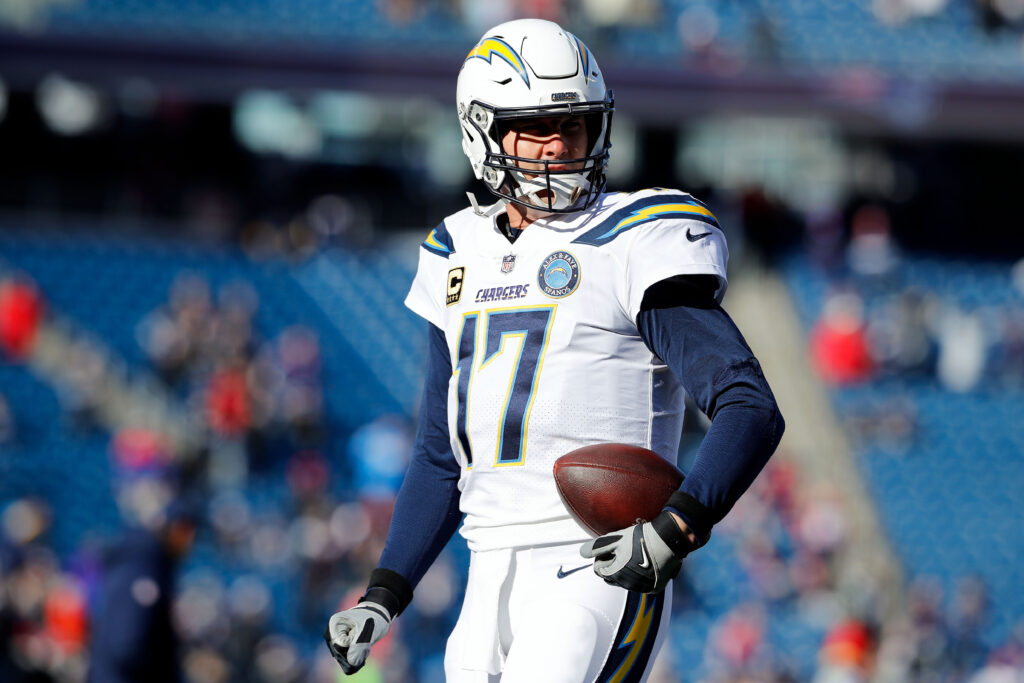
 Los Angeles Chargers: Philip Rivers
Los Angeles Chargers: Philip Rivers
Deciding between Dan Fouts and Philip Rivers is one of the closer battles on our list. Fouts puppeteered the start of the Air Coryell offense, which is still a major part of what we see in today's league. However, Fouts' play outside of the offense clearly dipped, and he doesn't have a Super Bowl ring to push him above Rivers.
Rivers is one of four quarterbacks to reach 63,000 passing yards and 420 touchdowns. He played in an era with Brady and Manning, which likely played a big part in why he never won the big game. But he had 10 seasons with at least 4,000 yards in an 11-year stretch and never completed less than 60 percent of his passes once he became the full-time starter.
Rivers was magnificent, and often so, despite playing with some limited teams as his career progressed.
NFC East
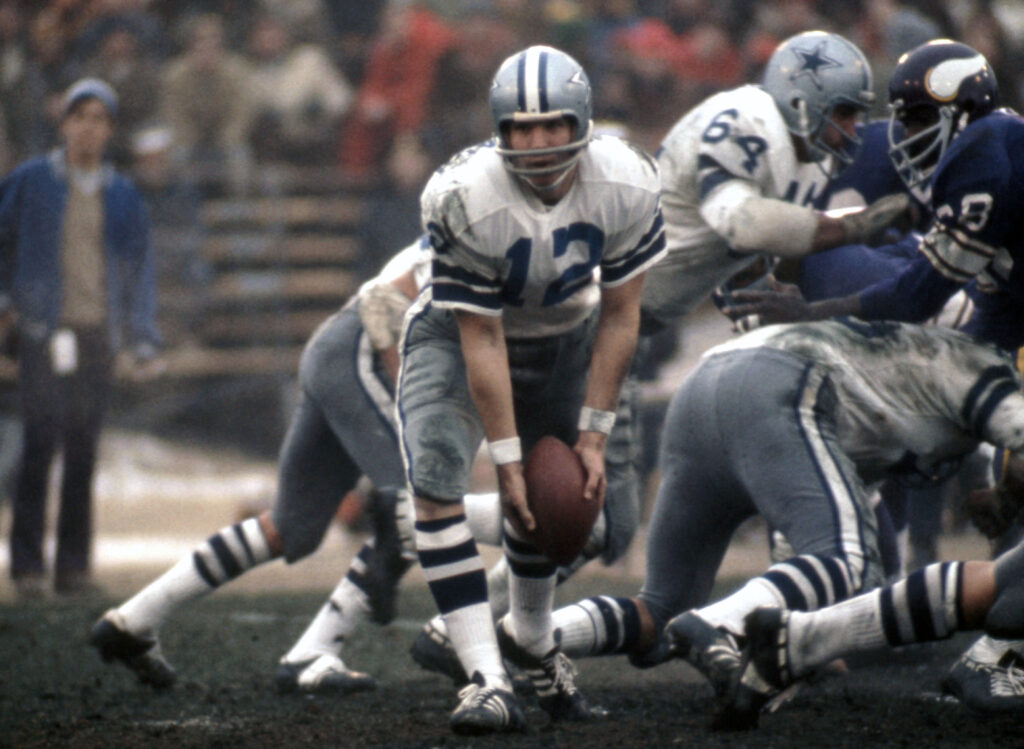
 Dallas Cowboys: Roger Staubach
Dallas Cowboys: Roger Staubach
Six quarterbacks have a career annual value more than 80 in the Dallas Cowboys' legacy, so the competition is high for this top spot. Some would argue for Troy Aikman to get the nod, but Roger Staubach was the franchise's first major star. Staubach joined the Cowboys at 27 years old after serving in the Navy, was a backup for three seasons, and still ended up as a six-time Pro Bowler and two-time Super Bowl champion.
His efficiency for the era was stellar, and the result was Dallas racked up wins throughout Stabauch's career. He won 85 of 114 games started and never had a losing season. Had Staubach enjoyed a longer career, his counting stats would've left no doubt about where he stands in the storied franchise's history, but we recognize his importance anyway.
On December 12, we look at the career of the legendary No. 12, Roger Staubach.
— Pro Football Hall of Fame (@ProFootballHOF) December 12, 2023
You can learn more about him when visiting the Hall of Fame.
Visit The Hall: https://t.co/sDATo6VbBv pic.twitter.com/lotanvh4CE
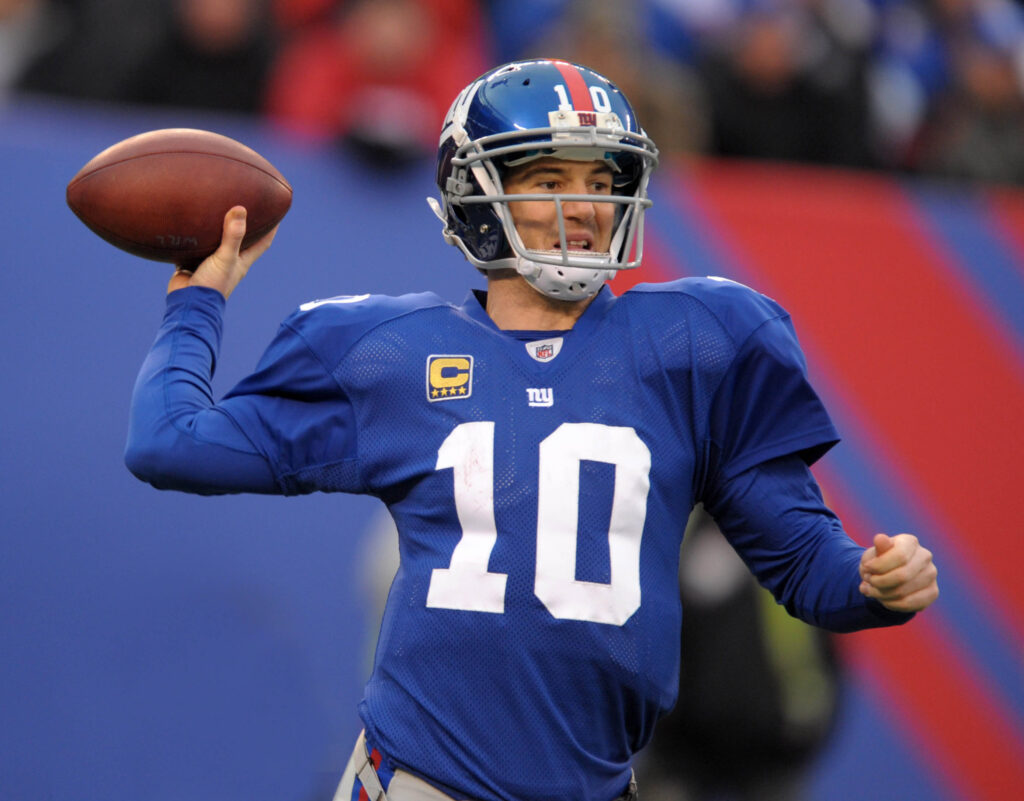
 New York Giants: Eli Manning
New York Giants: Eli Manning
It feels strange to list Eli Manning as the best quarterback in New York Giants' history because he wasn't a great quarterback compared to his peers for stretches of his career. He was a throwback quarterback in the modern era and more reliant on big plays than being a consistently efficient decision-maker. However, Manning won two Super Bowls, and his best seasons were Pro Bowl-worthy.
His closest competition is Phil Simms, who also won two titles and made two Pro Bowls. But Simms' career was marred by injuries, so his resume largely depends on seven seasons compared to Manning's 16. Manning's longevity led to a complete rewrite of the team's passing record book.
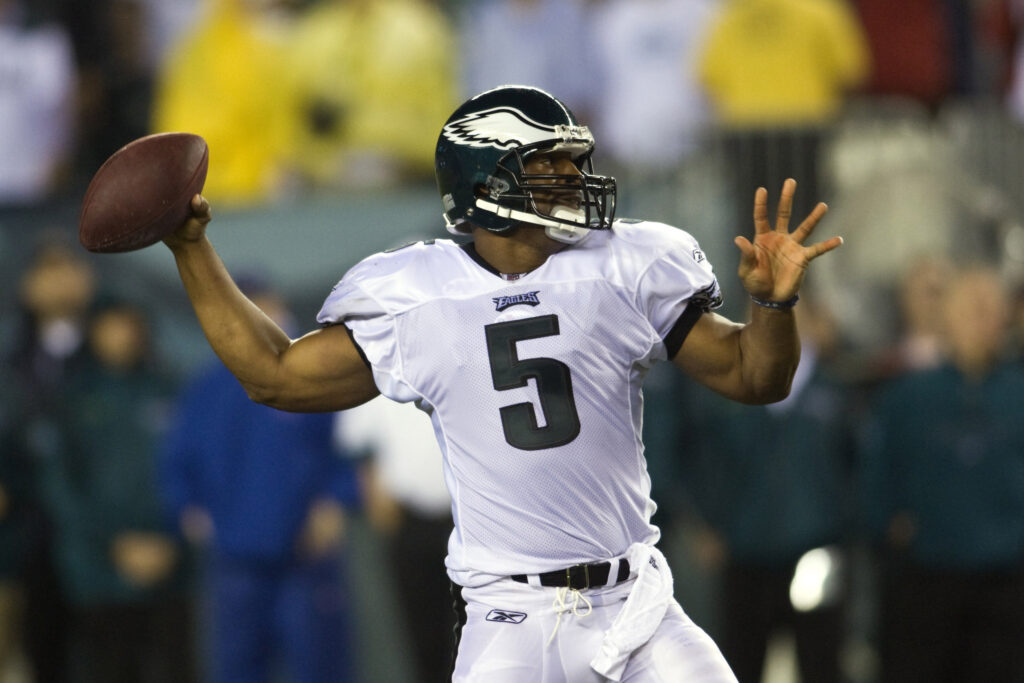
 Philadelphia Eagles: Donovan McNabb
Philadelphia Eagles: Donovan McNabb
The Philadelphia Eagles had a progressive quarterback run that just kept improving as decades passed. It began with Ron Jaworski, then moved to Randall Cunningham, and then to Donovan McNabb. Both Jaworski and Cunningham had solid stints in Philly, but McNabb was consistently more successful over a longer period of time than either.
McNabb and Andy Reid won 92 games together over 11 years and were on the brink of a Super Bowl win in 2004. McNabb was a gritty dual-threat playmaker who overcame inconsistent accuracy with quality decision-making and processing. He hit the 3,000-yard mark seven times, and his 2.1 percent interception rate was even more impressive before this current generation of passers cut down on turnovers even more.
20(!) years ago
— Eagles Fan Central (@EagleFanCentral) January 11, 2024
Eagles come back down 14-0, beat Green Bay 20-17 in OT, capping an epic Divisional weekend
Donovan McNabb had a heroic night: 1st QB to rush for 100 yds in a playoff game, and hit Freddie Mitchell on 4th & 26 with 1:07 left to save it all pic.twitter.com/E4DAPJvJom
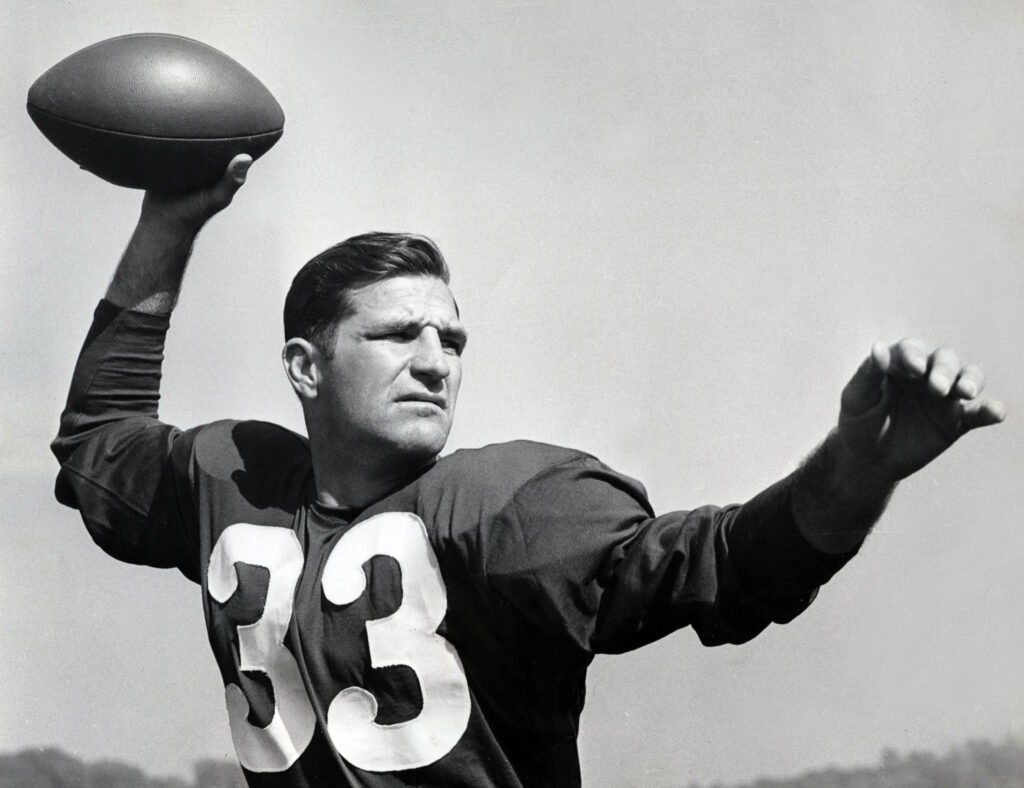
 Washington Commanders: Sammy Baugh
Washington Commanders: Sammy Baugh
Ranking a player who competed from 1937 to 1952 over two quarterbacks we can more easily find games of is a tough one, but it's easier to justify considering Slinging Sammy Baugh essentially invented the forward pass and made the position the most important on the field.
He's still the team's leader in touchdown passes (187) and third in passing yards (21,886) despite throwing more than 255 times in only two seasons over the course of his career.
The game was clearly different back then, but the six-time Pro Bowler and four-time All-Pro member led Washington to two championships and shaped modern football. He was as dynamic as any playmaker over several decades. If it weren't for Baugh, Joe Theismann and Sonny Jurgensen would have claims for the honor.
NFC North
 Chicago Bears: Sid Luckman
Chicago Bears: Sid Luckman
While we went back to the 1940s for Baugh because he was so influential and good, we're back to that era for the Chicago Bears' pick because their quarterback history is impossibly abysmal. Jim McMahon and Jay Cutler had some bright spots in the Windy City, but Sid Luckman was fantastic throughout the 1940s. He's the runaway best choice.
Playing quarterback, defensive back, and punter, the Hall of Famer won four championships and made five All-Pro teams. Luckman led the NFL in passing yards and touchdowns three times as the game continued to evolve. He's second in franchise history in yards and touchdowns despite playing in an era where most teams were still figuring out how to throw the ball downfield.
Sid Gillman, Father of the Modern Pro Passing Game
— Kevin Gallagher (@KevG163) February 16, 2022
His "mad scientist"-like approach, along with legends such as Al Davis, Len Dawson, John Hadl, Daryle Lamonica, and Joe Namath, propelled passing offense into a lethal weapon in the AFL during the 1960s. pic.twitter.com/JjYucDJtA1
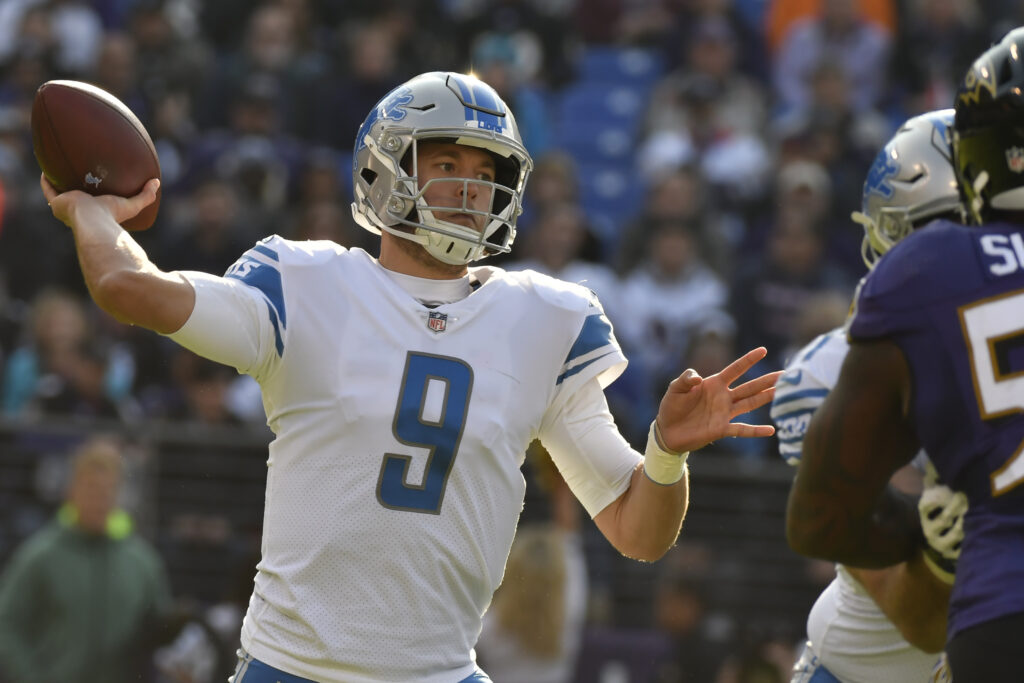
 Detroit Lions: Matthew Stafford
Detroit Lions: Matthew Stafford
While there might be an argument for Bobby Layne as the Detroit Lions' most successful quarterback with two NFL Championships, the production chasm between the 1950s star and Matthew Stafford can't be ignored. Stafford is Detroit's passing leader by almost 30,000 yards and 164 touchdowns. Even though he won only 74 of 165 games in Detroit and made one Pro Bowl, it was always clear he suffered from limited teams more than part of the problem.
Detroit's lack of other options is startling. Scott Mitchell and Greg Landry were little more than fine stopgaps, but Jared Goff has quickly put himself into the conversation of one of the franchise's better QBs.
It's unlikely Goff could catch up to Stafford's huge production advantage, but a Super Bowl ring would make this discussion more interesting one day.
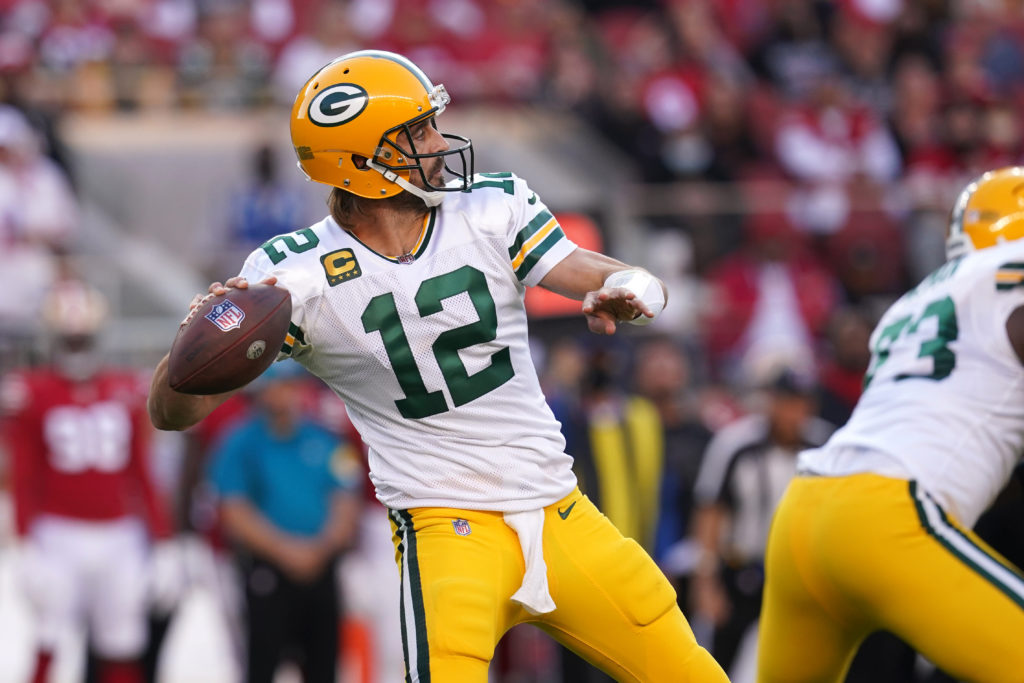
 Green Bay Packers: Aaron Rodgers
Green Bay Packers: Aaron Rodgers
Some teams are scraping the bottom of the barrel to find the best quarterback candidate, while the Green Bay Packers have a deep history with three amazing options. Though Brett Favre has the most passing yards on the franchise's leaderboard and Bart Starr captained a dynasty, Aaron Rodgers is among the most gifted throwers in league history. Prime Rodgers was a stunning blend of highlight throws and an innate aversion to turnovers like we've never seen.
His 15 years as a starter in Green Bay didn't always bring the postseason success that his talent level usually dictates, but Rodgers also played in the deepest QB era yet. What matters is he completed 65.3 percent of his passes for more than 59,000 yards, 475 touchdowns, and only 105 interceptions during that timeframe.
The only thing more jaw-dropping than his stats include the countless examples of precise passing while on the move and how his annual value (231) beat out his games played (230) over an elongated period.
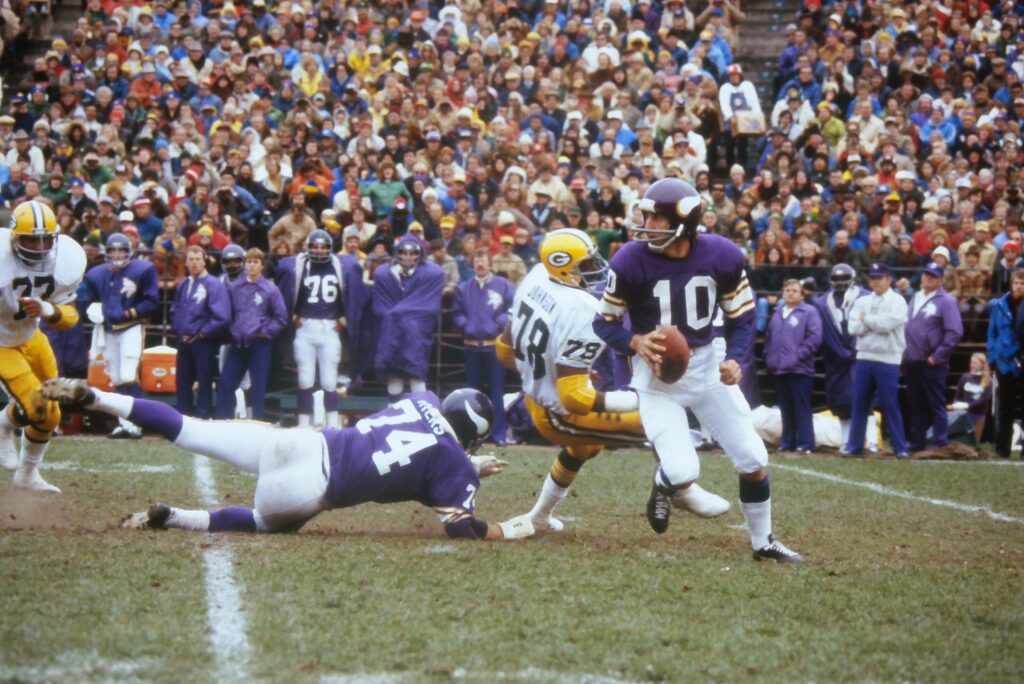
 Minnesota Vikings: Fran Tarkenton
Minnesota Vikings: Fran Tarkenton
Spending two stints with the Minnesota Vikings during his 18-year career, Fran Tarkenton was one of the first undersized, dynamic quarterbacks in the NFL. He was accurate for the 1960s and 1970s and a dual-threat who racked up 3,674 rushing yards and 32 touchdowns. Even though some of his best years happened in the five years he spent with the Giants before returning to Minnesota, Tarkenton is most recognizable with the Vikings.
A Hall of Famer with six Pro Bowls and an All-Pro spot as a Viking, Tarkenton is well ahead on the franchise's board of wins (91), value (158), yards (33,098), and touchdowns (239).
Guys like Daunte Culpepper, Tommy Kramer, and Brad Johnson had their moments, but Tarkenton had the longevity and bigger impact on the game.
HOF QB Fran Tarkenton led the @Vikings to three Super Bowl appearances...and nobody could catch him. #NFLHistory@NFL pic.twitter.com/smjGPD5SPu
— NFL Legacy (@NFLLegacy) January 21, 2018
NFC South
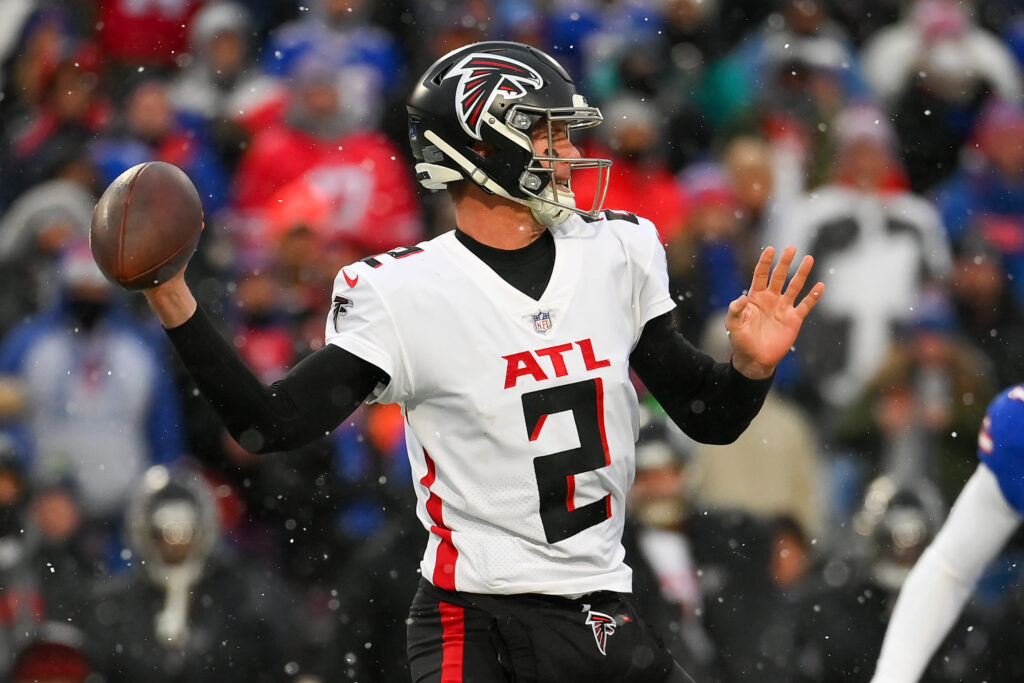
 Atlanta Falcons: Matt Ryan
Atlanta Falcons: Matt Ryan
Michael Vick was the Atlanta Falcons' most influential quarterback of all time, but Matt Ryan will be the quarterback associated with Atlanta for years to come. From 2008 to 2021, Ryan became one of the NFL's most reliable and consistent passers despite rarely having a competent defense or running game to help.
He completed 65.5 percent of passes and finished his 14-year run with Atlanta with 59,735 yards and 367 touchdowns.
Ryan, a four-time Pro Bowler, one-time All-Pro, and the 2016 MVP, ushered the Falcons from Vick's off-field scandal into an era with 124 wins in 234 games. He was on the doorstep of a Super Bowl win in 2016, but Brady and the Patriots kept Ryan from achieving the last piece of what was a Hall of Fame career.
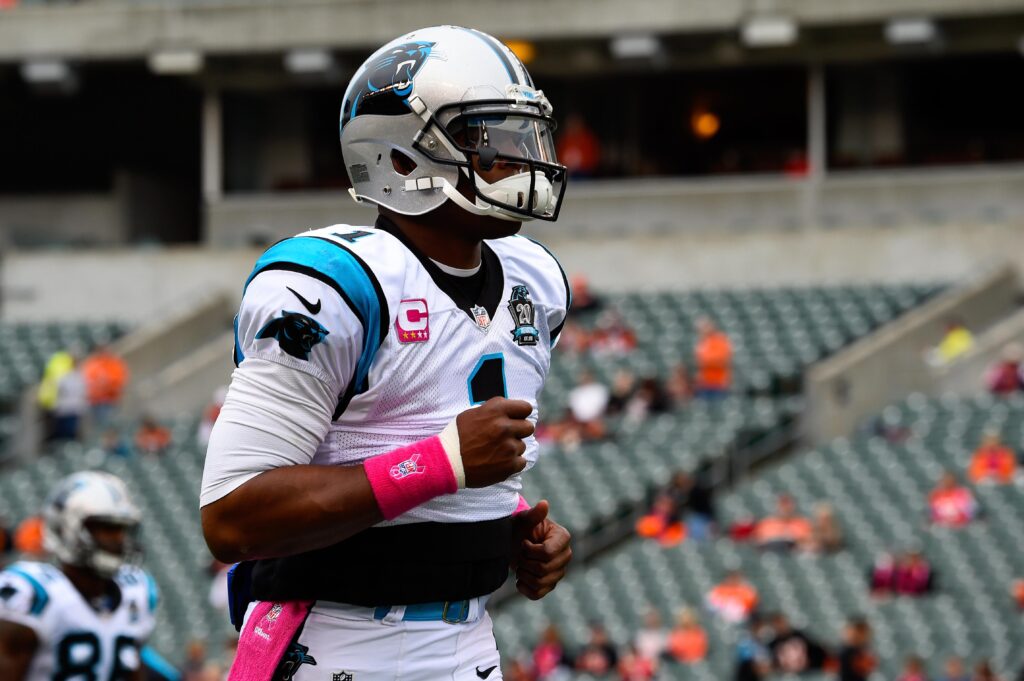
 Carolina Panthers: Cam Newton
Carolina Panthers: Cam Newton
Since the Carolina Panthers began in 1995, they had rostered a string of decent but physically limited starters through 2011. Jake Delhomme became one of the league's best game managers and nearly won a Super Bowl. Steve Beuerlein led the NFL in completion rate and yards despite being in his mid-30s.
But neither holds a candle to Cam Newton. Newton brought immediate relevance to the franchise, earning three Pro Bowls, an All-Pro nod, the 2015 NFL MVP Award, and bringing them to the brink of their first title. A devastating power thrower and rusher, Newton's peak powers made him one of the league's scariest and most exciting talents to watch.
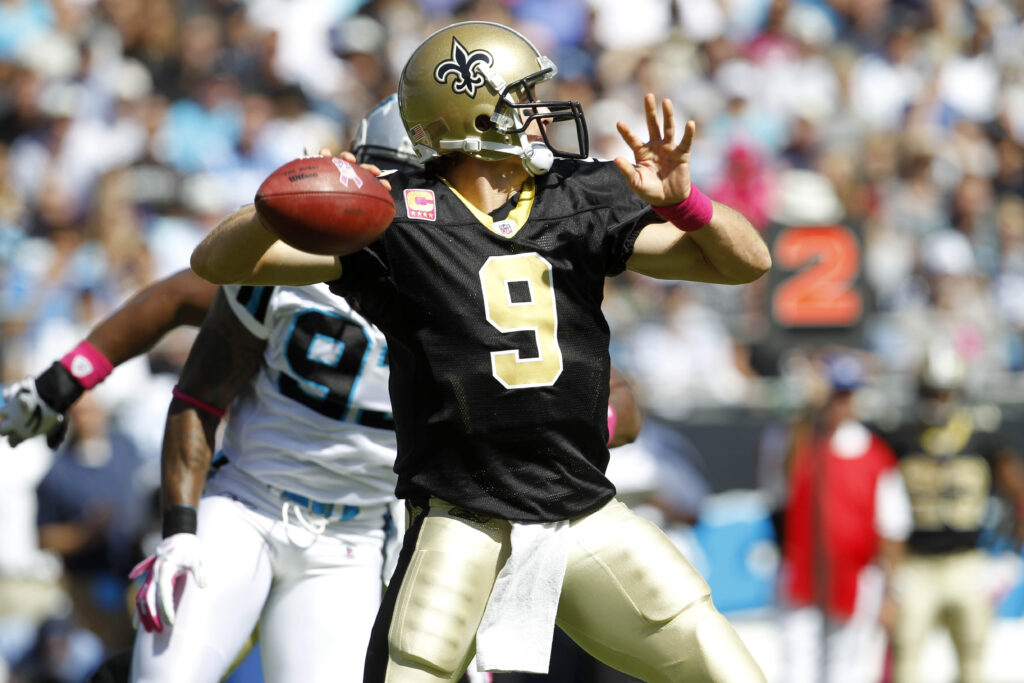
 New Orleans Saints: Drew Brees
New Orleans Saints: Drew Brees
The New Orleans Saints' history of quarterback play was bleak until Drew Brees evolved into an all-time legend alongside Sean Payton. Archie Manning won only 35 of 134 games, and Aaron Brooks had the best touchdown-to-interception ratio of any other established starter for the franchise. Brees provided an amazing run from 2006 to 2020.
Leading the NFL in completion rate and yards six times, Brees' ability to remain efficient despite operating one of the most pass-happy offenses we've seen was unique. His accuracy was one of a kind, and he compensated for his flaws as well as anyone in NFL history at the position. With 68.010 yards, 491 touchdowns, and a career 68.8 percent completion rate, Brees will be at the top of New Orleans' leaderboard for a long time, if not forever.
The best of @drewbrees in 2009, the year he delivered a Super Bowl title to New Orleans 🏆 pic.twitter.com/JiyZYJNA8v
— NFL Legacy (@NFLLegacy) March 15, 2021
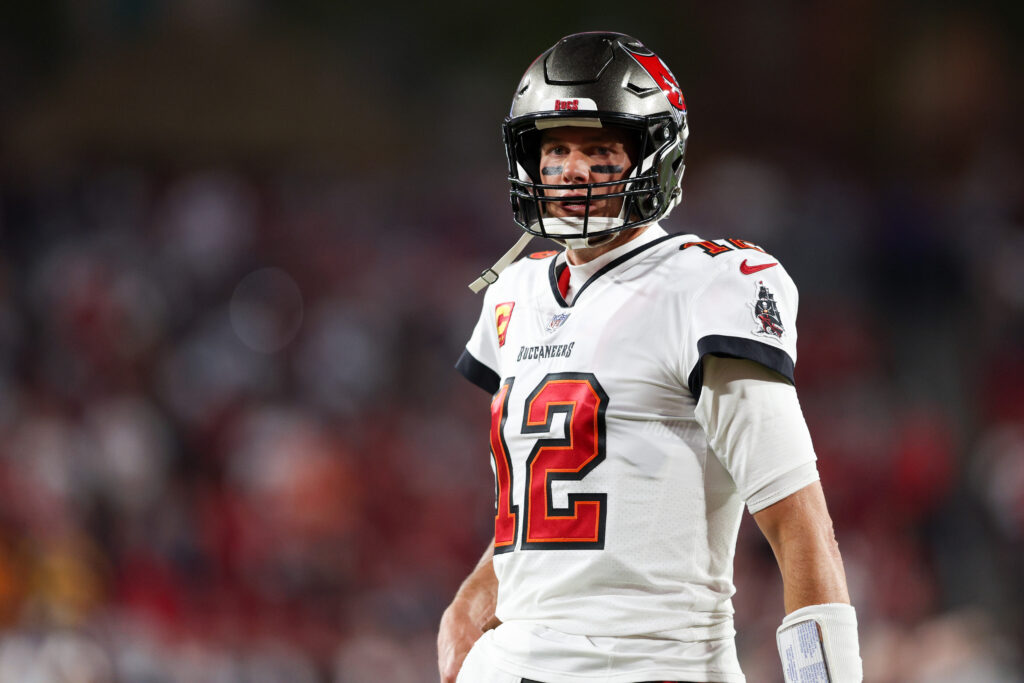
Tampa Bay Buccaneers: Tom Brady
The Tampa Bay Buccaneers' history, or lack thereof, of sustained quarterback play is astounding. No quarterback has played more than 79 games under center for Tampa Bay, and only three have won 30 games. The only starter with more than 25 starts who has a winning record is Tom Brady.
Brady played three seasons for the Buccaneers and ranks third in yards, wins, and second in touchdowns. He led the NFL in passing attempts twice and yards and touchdowns once. Of course, he also won the Super Bowl in 2020, giving the franchise its second title.
NFC West
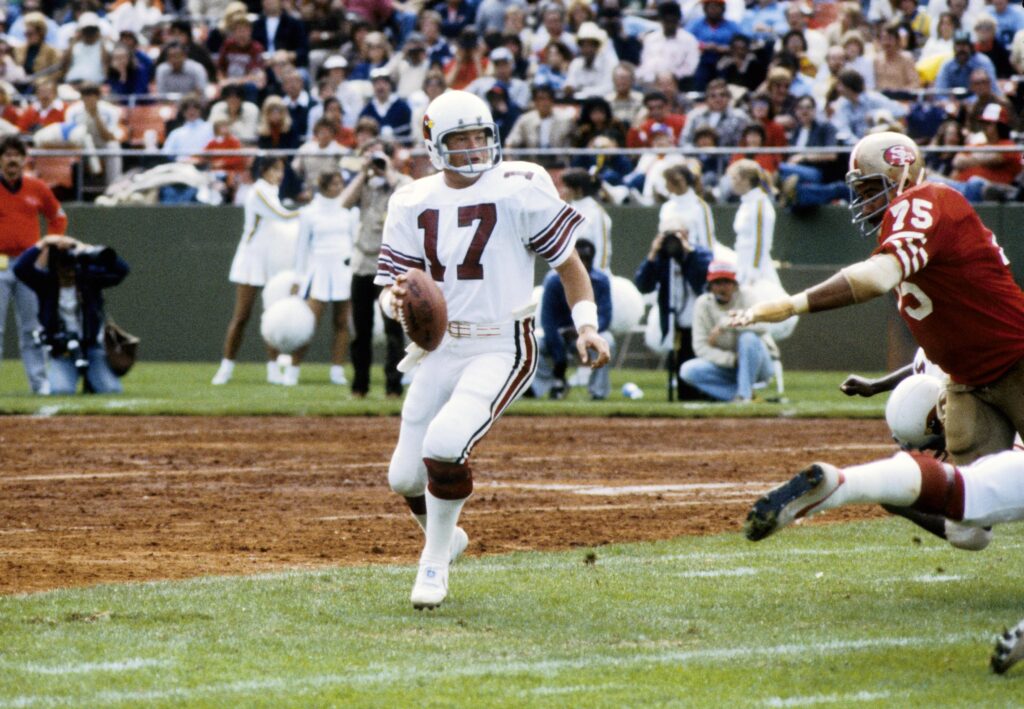
 Arizona Cardinals: Jim Hart
Arizona Cardinals: Jim Hart
By spending 18 seasons with the St. Louis Cardinals, Jim Hart was one of the first players ever associated with the franchise after the merger. His numbers weren't especially good or bad for the 1970s in particular. He led the league in most interceptions thrown once, the lowest interception rate once several years later, and most passing attempts once.
However, he was a stabilizing presence who guided the team to three straight double-digit win seasons when the roster around him was capable. He leads the franchise with an 87-88-5 record, 34,639 passing yards, and 209 touchdowns. Kyler Murray has a good chance of overtaking Hart if he stays in Arizona long enough to challenge Hart's passing records.
November 10, 1968
— St. Louis Football Cardinals (@BigRed_STL) November 11, 2023
Jim Hart threw for a career high 353 yards and 3 TDs, but it wasn't enough as the Cardinals tied the one-win Steelers 28-28.
The tie cost the Cardinals the division title as they finished a half-game behind the Browns who they had beaten twice.#BigRed1960s pic.twitter.com/G5J8xbqPRE
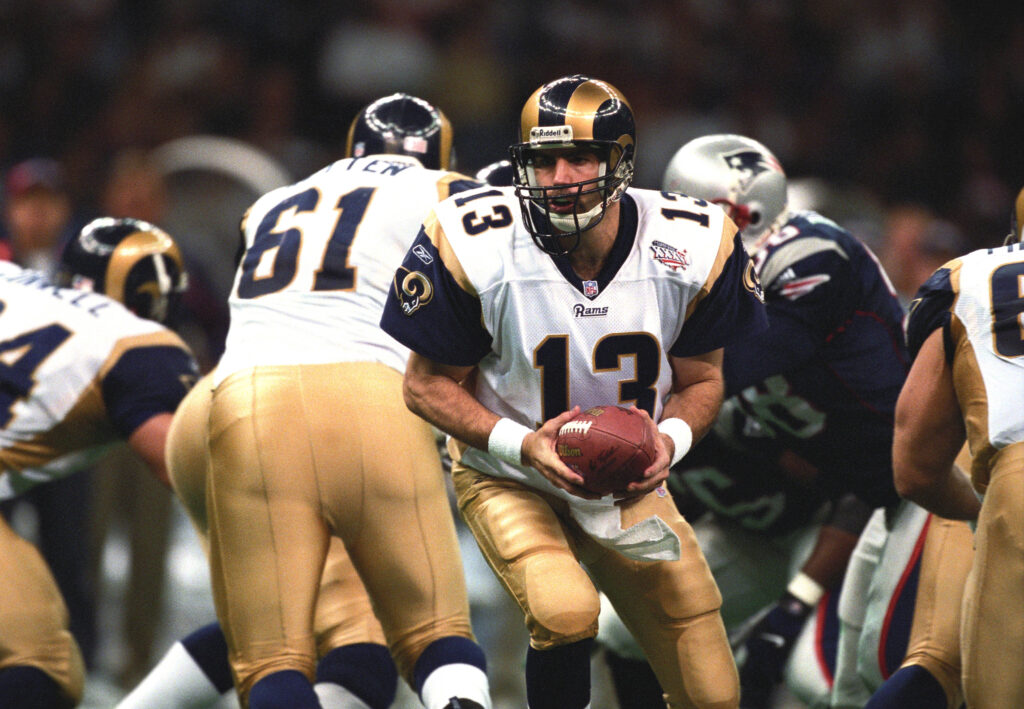
Los Angeles Rams: Kurt Warner
Few teams have an eclectic passing leaderboard as the Los Angeles Rams. Jim Everett leads the franchise in yards, but Roman Gabriel has 28 more wins and 12 more touchdowns. Marc Bulget and Jared Goff had great stats but didn't climb the mountain like Matthew Stafford.
However, none of them reached a peak like Kurt Warner did for the Rams. Warner won 35 of 50 starts, completing 66.4 percent of attempts for 102 touchdowns. He's a Hall of Famer, making two All-Pro teams and three-straight Pro Bowls from 1999 through 2001.
He fell off sharply after Bill Belichick exposed the flaws in Mike Martz's offense, but Warner's immense impact in that short time is deserving of this spot.
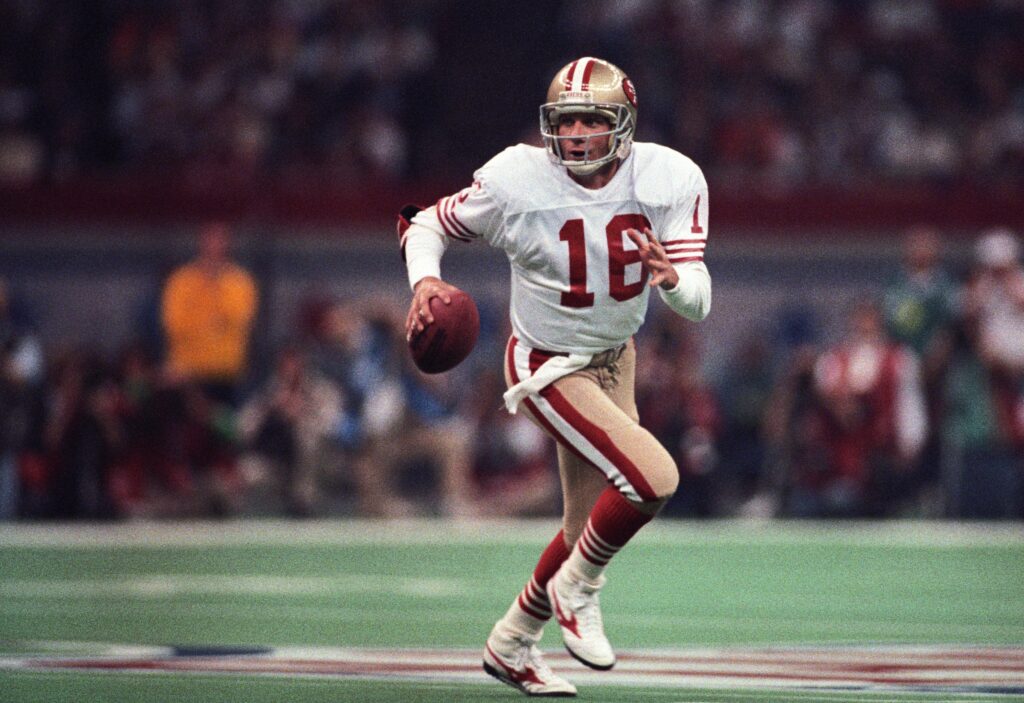
 San Francisco 49ers: Joe Montana
San Francisco 49ers: Joe Montana
Similar to other franchises that have produced a dynasty, the San Francisco 49ers have several all-time talents associated with them. Y.A. Tittle and Steve Young would headline most franchise leaderboards, but Joe Montana stands as one of the very best of all time, regardless of team. Joe Cool was the league's premier winner before Brady shattered all records.
The Hall of Famer made seven Pro Bowls, three All-Pros, two MVPs, and won four Super Bowls in San Francisco. He was part of the West Coast offense revolution that turned the league on its head. His accuracy, decision-making, and consistency was perfect for the system, and it led to five seasons as the league's completion rate leader and two years as the touchdowns leader.
.@JoeMontana in the 1989 playoffs:
— NFL Legacy (@NFLLegacy) June 11, 2019
▪️11 TDs, 0 INTs
▪️78.3% completion rate
▪️146.4 QB rating
▪️267 yards per game
The greatest postseason run ever by a QB? 🤔 @49ers pic.twitter.com/7fypRl3zjS
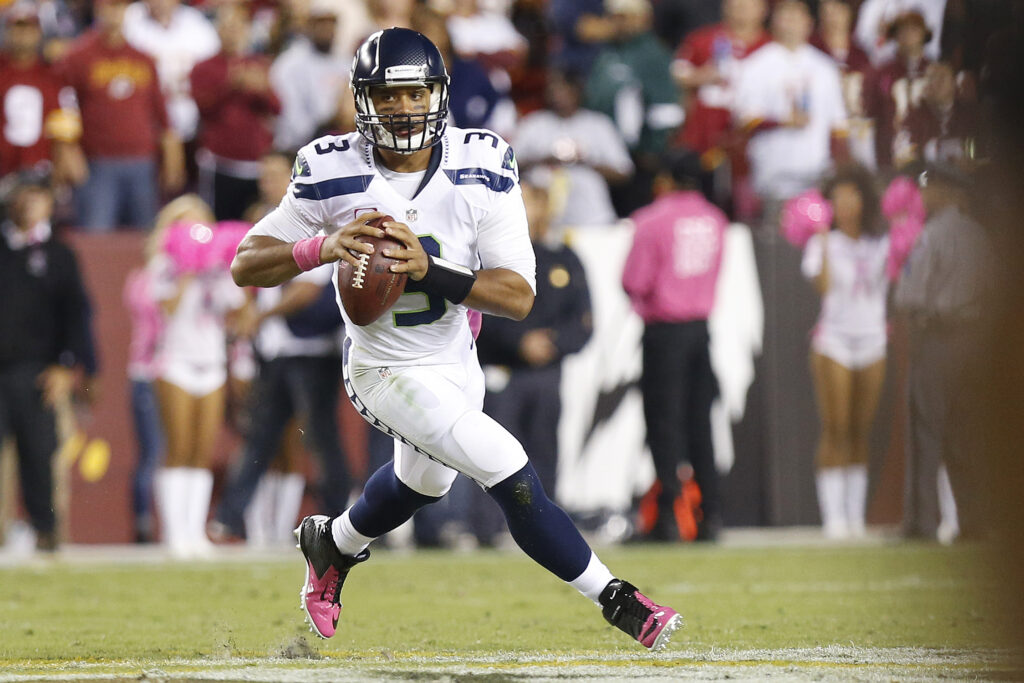
 Seattle Seahawks: Russell Wilson
Seattle Seahawks: Russell Wilson
Few quarterbacks in NFL history had the blend of deep passing prowess, accuracy, and efficiency as Russell Wilson during his peak years. He was electric in Seattle, completing 65 percent of his passes for 37,059 yards, 292 touchdowns, and just 87 interceptions.
The Seattle Seahawks had previously enjoyed quality quarterback play from Matt Hasselbeck and Dave Krieg, but Wilson was a difference-maker who produced a winning season in nine of his 10 years with the franchise.
Though Wilson's workload was always managed to keep him healthy and efficient, he executed his role to an extraordinary level. With nine Pro Bowls and a Super Bowl ring in his cabinet, Wilson is safely the best quarterback in Seahawks history.
